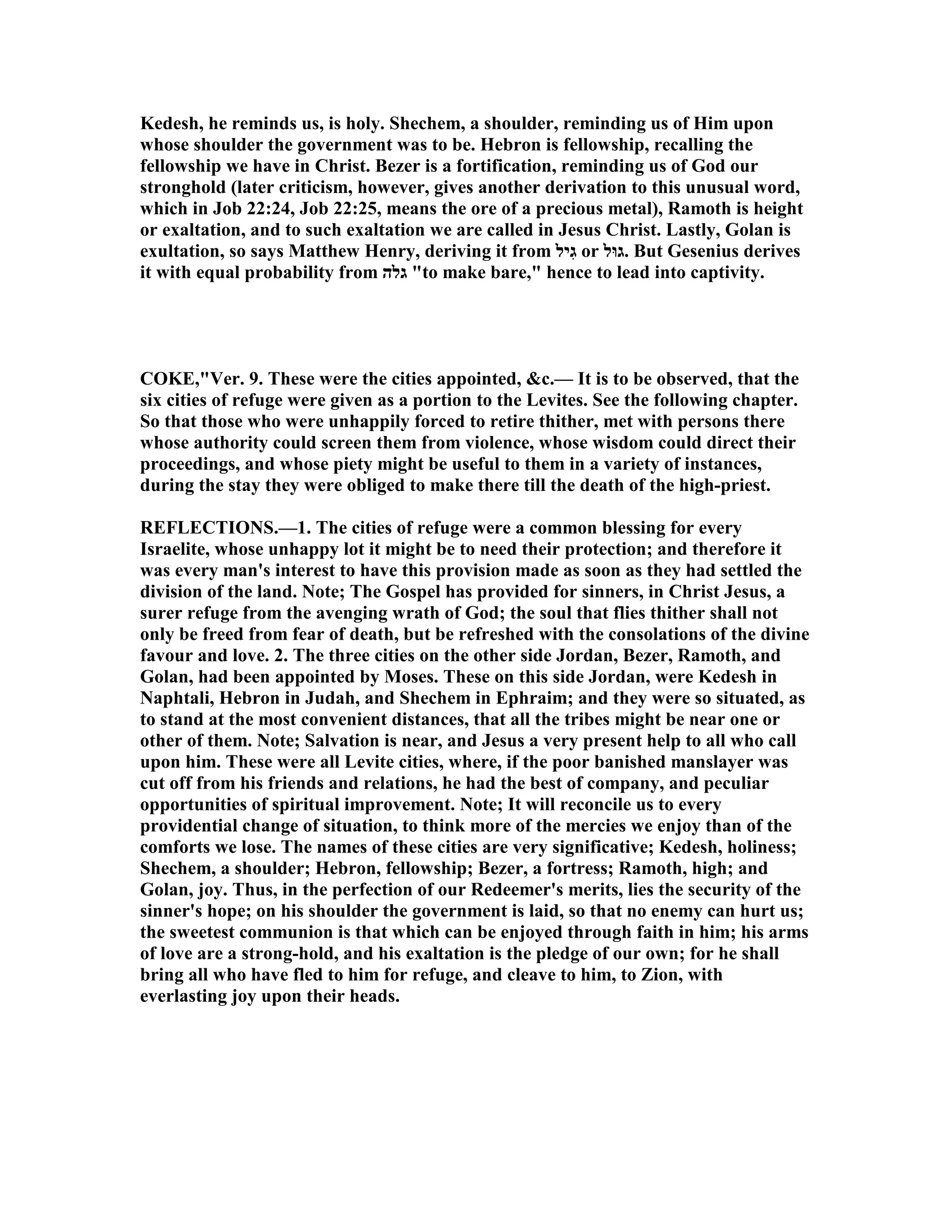Joshua 20 commentary discusses the appointment of cities of refuge in Canaan as commanded by God. The commentary provides context on the biblical passages about cities of refuge and explains their purpose in providing protection for those who accidentally killed someone from vengeance. Multiple scholars and commentators are cited discussing details of the cities of refuge and their significance as a type of salvation found in Christ.
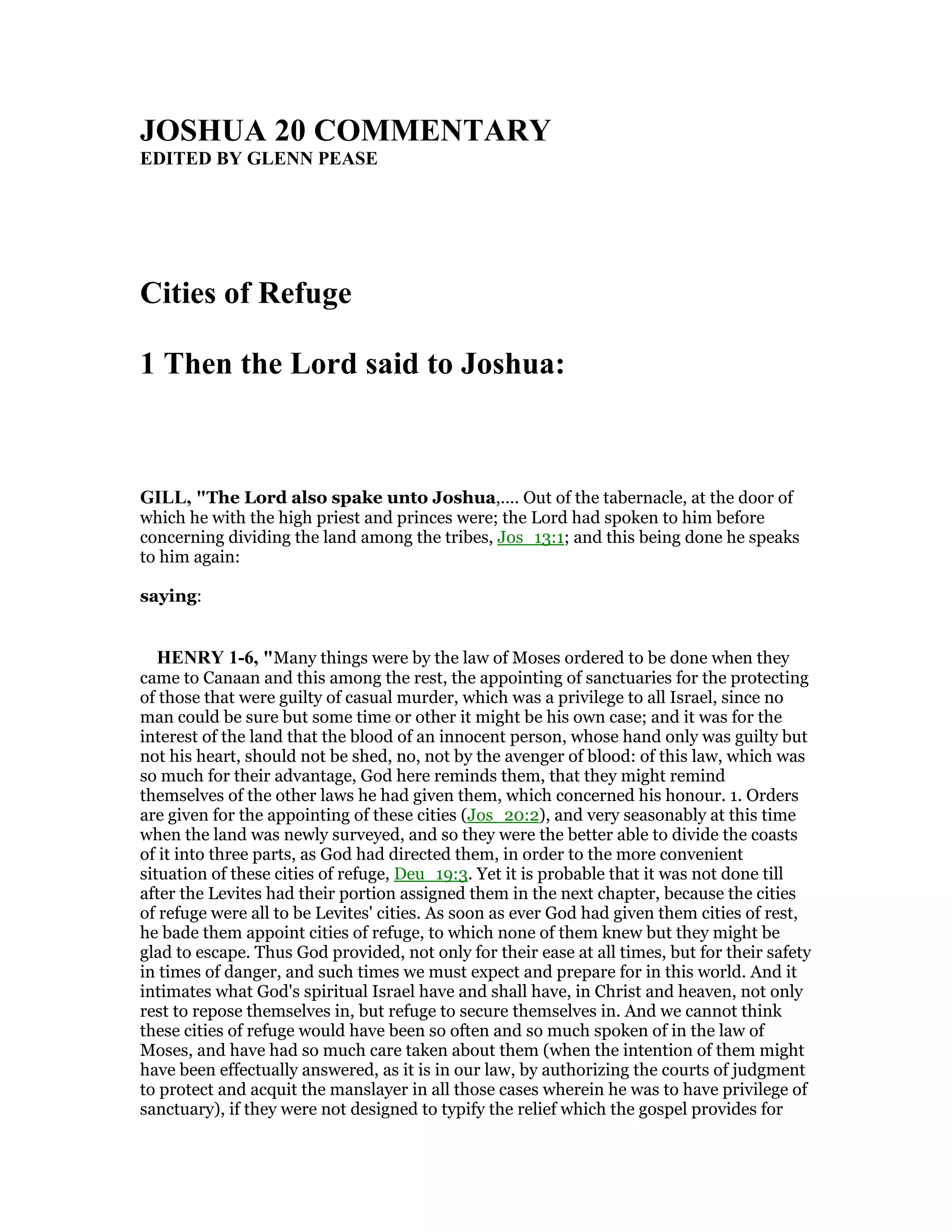



![able to return to or remain in the city of refuge and be safe ( umbers 35:9-15;
Deuteronomy 19:1-13). The refuge was for those who had killed accidentally, not for
deliberate murder. To take blood vengeance on a man in a city of refuge was a
heinous crime and made the perpetrator himself a murderer, whereas seemingly
blood vengeance elsewhere did not. But the blood relative had the right to demand
that there should be a trial.
“The avenger of blood” is literally ‘redeemer of blood’. The Hebrew is ‘goel had-
dam’. A ‘goel’ is one who acts as next of kin, whether by marrying a kinsman’s
widow (Ruth 3:12 on); by exacting a payment due to the deceased ( umbers 5:8); by
buying a kinsman out of slavery; by buying back a field which had been sold
through poverty (Leviticus 25:48; Leviticus 25:25) or by buying back an estate into
the family (Jeremiah 32:7 on). As redeemer of blood he exacts recompense on behalf
of the dead man. It was thus not seen as murder but as justice, a life for a life.
Indeed to fail to do so would bring the family into disrepute.
COFFMA , "Verse 1
THE CITIES OF REFUGE
The cities of refuge have already been discussed in umbers 35:9-33, in
Deuteronomy 4:41-43, and in Deuteronomy 19. About the only information given in
this chapter is that Joshua did as he was commanded and named the additional
cities west of Jordan, enumerating the names of those and repeating the names given
in Deuteronomy 4:43.
There is hardly anything in the Bible about which there is more misinformation
than is the matter of these six cities of refuge. The basic assumption of critical
scholars is dogmatically stated by Holmes:
"The cities of refuge were not appointed until after the reforms of Josiah in 621 B.C.
In earlier times the refuge for the manslayer was the altar at the local sanctuary
(Exodus 21:14). Deuteronomy says that Moses commanded the institution of these
cities, and a later writer, ignorant of the exact standpoint of the Deuteronomic
school, naturally concluded that Joshua carried out that command. Accordingly, he
stated as fact what he thought should have happened ... The standpoint of
Deuteronomy was that the cities of refuge were to be appointed after the Temple of
Solomon was built! This being so, there was no need for Joshua to appoint these
cities."[1]
Such an impressive bundle of false statements contradicting the Holy Bible in half a
dozen particulars should be received only by those who are willing to deify "the
REVERE D Samuel Holmes" and all others like him, and to accept their
U PROVED ASSERTIO S as "the Word of God," instead of what is written here!
The fiction that these cities of refuge were not appointed until the times of Josiah
(621 B.C.) is, of course, FALSE. Three of the cities were appointed by Moses east of
Jordan; and three were appointed by Joshua west of Jordan, as directed by God
Himself (Joshua 20:1). That these cities were OT in existence until the seventh](https://image.slidesharecdn.com/joshua20commentary-160726122214/75/Joshua-20-commentary-5-2048.jpg)
![century is a prime assertion of the critics, as Boling attempted to prove in this
statement:
"There is not a single reference to either one of these institutions (the cities of
refuge, or the Levitical cities) in the historical books of 1,2Samuel, 1,2Kings, and
1,2Chronicles, and nowhere are they clearly presupposed."[2]
Apparently, Boling had never heard of the case of Abner, who following his
unwilling and forced slaughter of Asahel, Joab's brother, fled to Hebron (one of the
cities of refuge), and how Joab followed him there, pretended friendship,
maneuvered Abner just across the city line in the gate, just outside the city of refuge,
and thrust a dagger through his heart. David himself followed the body of Abner
through the streets crying, "Died Abner as a fool dieth"! Upon no other assumption
whatever can it be affirmed that Abner died "as a fool," except upon the
presupposition that he simply allowed himself to be maneuvered to a location just
outside the city of refuge, thus giving Joab the opportunity he wanted! The full
record of all this is in 2 Samuel 2-3.
However, even if there did not exist any record of exactly how certain persons made
use of any of these cities of refuge, that would not deny the existence of the
institution and the appointment of these cities as revealed here. There are a hundred
provisions of the Law of Moses which could be denied on the proposition that the
Bible does not tell how some person, or persons, fulfilled or applied the law in
specific cases. In the historical books, where are the examples of persons cleansed
from leprosy? Where do we find the ashes of the red heifer applied? Who can cite a
house that was purified from leprosy? etc.
"And Jehovah spake unto Joshua, saying, Speak to the children of Israel, saying,
Assign you the cities of refuge, whereof I spake unto you by Moses, that the
manslayer that killeth any person unwittingly and unawares may flee thither: and
they shall be unto you for a refuge from the avenger of blood. And he shall flee unto
one of these cities, and shall stand at the entrance of the gate of the city, and declare
his case in the ears of the elders of that city; and they shall take him into the city
unto them, and give him a place that he may dwell among them. And if the avenger
of blood pursue after him, then they shall not deliver up the manslayer into his
hands; because he smote his neighbor unawares, and hated him not beforetime. And
he shall dwell in that city, until he stand before the congregation for judgment, until
the death of the High Priest that shall be in those days: then shall the manslayer
return, and come unto his own city, and unto his own house, unto the city from
whence he fled."
It is clearly stated here that God spake to Joshua, reminding him of what God had
already commanded Moses, and with the order to appoint the cities of refuge. Sons
of the Devil will have to produce something more than their tumid arrogance and
denial of this as sufficient inducement for believers to forsake what is written here
in the Word of God.
See the passages in Deuteronomy and umbers cited above for full discussion of the](https://image.slidesharecdn.com/joshua20commentary-160726122214/75/Joshua-20-commentary-6-2048.jpg)
![institution of the cities of refuge. The purpose of these was totally unlike the
"sanctuary" doctrine of pagan altars and shrines, like that which made the half mile
or so surrounding the city of Ephesus the greatest concentration of lawless and
wicked men ever heard of on the face of the earth. The purpose of these cities was
the protection, not of criminals generally, but of innocent men who had
inadvertently, or accidentally, killed someone. This institution was designed to
eliminate the blood feuds which abounded in antiquity, and which have persisted
into modern times. This writer was present when the notorious ewton-Carlton
feud of Paul's Valley, Oklahoma culminated in the murder of a Deputy Sheriff in
front of the J. C. Penny store just across from the Post Office there in 1926. Some
thirty murders had at that time occurred in that feud. Fortunately, the feud ended
at that time.
The mention of "stand before the congregation" in Joshua 20:6, is a reference to the
judgment exercised by the congregation of the city of refuge. The manslayer could
not leave that city, except to forfeit his life, and, from the way this is introduced
following the theoretical appearance of the avenger of blood, it would appear that
no such congregational judgment took place until the manslayer was accused by the
avenger of blood, and who, in that case, would have had the right to produce
witnesses. Upon the presumption that the manslayer would be acquitted, he then
could live in the city of refuge until the death of the High Priest. If found guilty, he
was, of course, handed over to the avenger of blood who had the right to execute
him.
As in so many instances of O.T. institutions, it is the .T. witness and application of
them that certifies their Divine origin, and eloquently demonstrates the Divine
inspiration that designed and created them. As the writer of Hebrews said, "We
have a strong encouragement who have fled for refuge to lay hold upon the hope set
before us, which we have as an anchor of the soul both sure and stedfast and
entering into that which is within the veil" (Hebrews 6:18,19).
The foolish theory that these cities of refuge were connected with the old pagan laws
of "sanctuary at altars," etc., is not, as alleged by Holmes and others, "revealed in
the Book of the Covenant (Exodus 21:14)."[3] A careful reading of that place shows
that God's altar was not a place of protection for the guilty. (See my comment on
this in Vol. 2 of the Pentateuchal series, pp. 307-309.) The habit of fleeing to some
altar on the part of the guilty persisted, and Joab himself was dragged from between
the horns of the altar in Jerusalem and executed for his murder of Abner (1 Kings
2:28-31).
The great typical meaning of the cities of refuge is:
(1) A place of refuge is provided for sinners in Christ.
(2) Safety is in him, not anywhere else; and not out of him.
(3) Safety continues only so long as the saved continue to be in Christ. Person must](https://image.slidesharecdn.com/joshua20commentary-160726122214/75/Joshua-20-commentary-7-2048.jpg)
![abide in him to be saved (John 15:6).
(4) The safety continued throughout the life of the High Priest. Safety continues for
repentant sinners throughout the dispensation of the reign of Christ. The connection
of the life of the High Priest with the safety provide here is an emphasis upon the
typical nature of the Jewish High Priest. (See my extensive comments on this in
Exodus (Vol. 2 of the Pentateuchal series, pp. 24:
COKE,"Ver. 1-6. The Lord also spake unto Joshua, saying, &c.— The great work
of distributing the lands being now finished, God orders Joshua to put the last hand
to the settlement of the cities of refuge, upon the footing which he had specified to
Moses. See on umbers 35 and Deuteronomy 19. The slayer was to stand at the gate
of the city, ver. 4 as being the place where the courts of justice were held.
CO STABLE, "Verses 1-9
1. The cities of refuge ch20
At this time, the tribal leaders formally designated the six cities of refuge, about
which Moses had received instructions ( umbers 35). Three stood west of the
Jordan: Kadesh in aphtali, Shechem in Prayer of Manasseh , and Hebron in
Judah ( Joshua 20:7). Three more were east of the Jordan: Bezer in Reuben,
Ramoth in Gad, and Golan in Manasseh ( Joshua 20:8). Their placement meant that
no Israelite would have to travel far to reach one of them. [ ote: See my notes on
umbers 35:9-34for further explanation of the cities of refuge.]
"The Christian community must take seriously its responsibility to examine penal
institutions and practices and seek to find the ways God would lead us to reform
such practices. The innocent man should not suffer unduly and the guilty man
should be given sufficient protection and hope for new opportunities as well as
sufficient punishment." [ ote: Butler, p218.]
"The cities of refuge ... seem to typify Christ to whom sinners, pursued by the
avenging Law which decrees judgment and death, may flee for refuge." [ ote:
Campbell, " Joshua ," p363.]
ELLICOTT, "THE I HERITA CE OF LEVI.
(a) Six cities of refuge (Joshua 20).
(b) Forty-two other cities (Joshua 21).
(a) THE CITIES OF REFUGE.
(2) Appoint out for you cities of refuge.—The law in umbers 35 appointed that the
Levites should have (Joshua 20:6) six cities of refuge, and forty-two others. This
connection is not always observed, but it has an important bearing on the institution
here described. The law of the cities of refuge is given in full in umbers 35 and](https://image.slidesharecdn.com/joshua20commentary-160726122214/75/Joshua-20-commentary-8-2048.jpg)


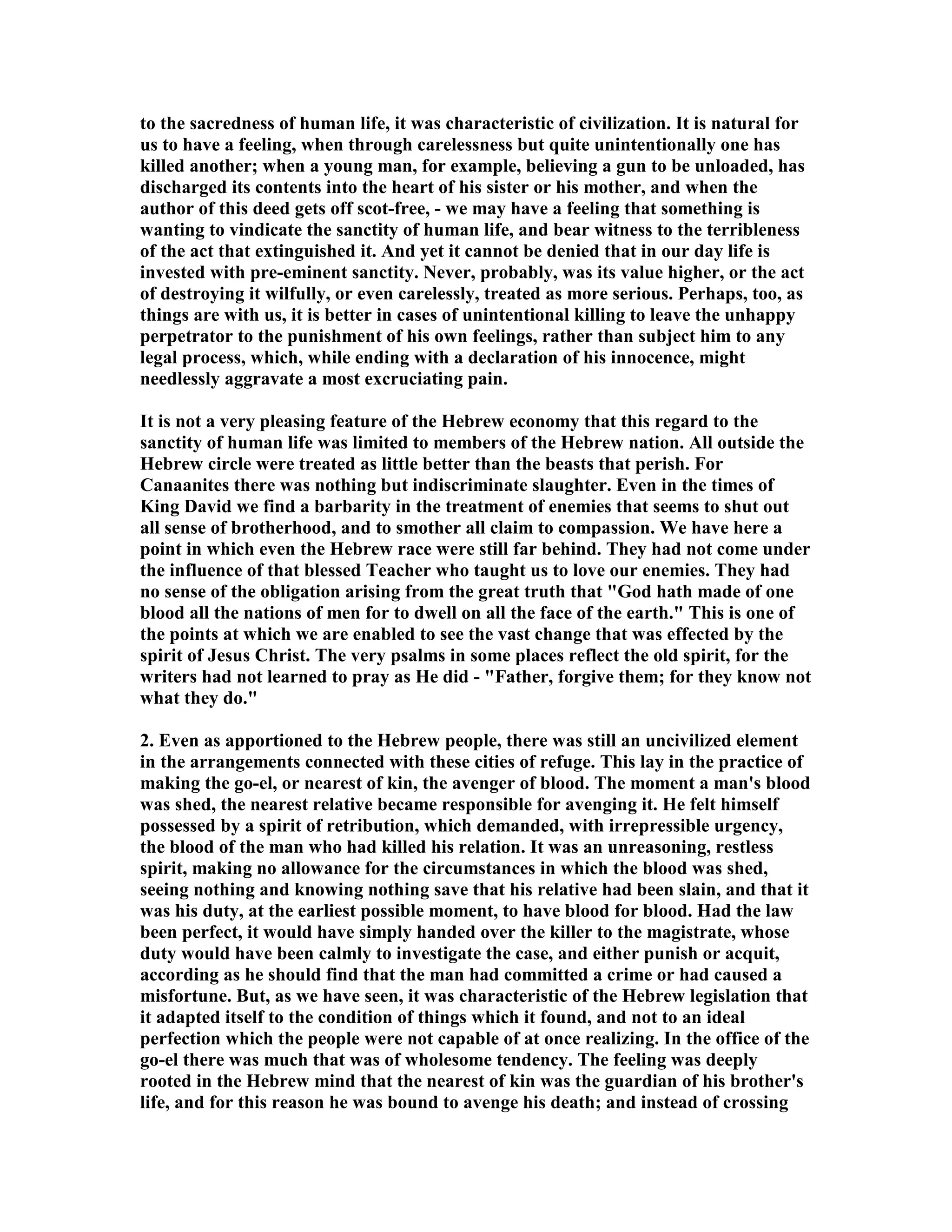

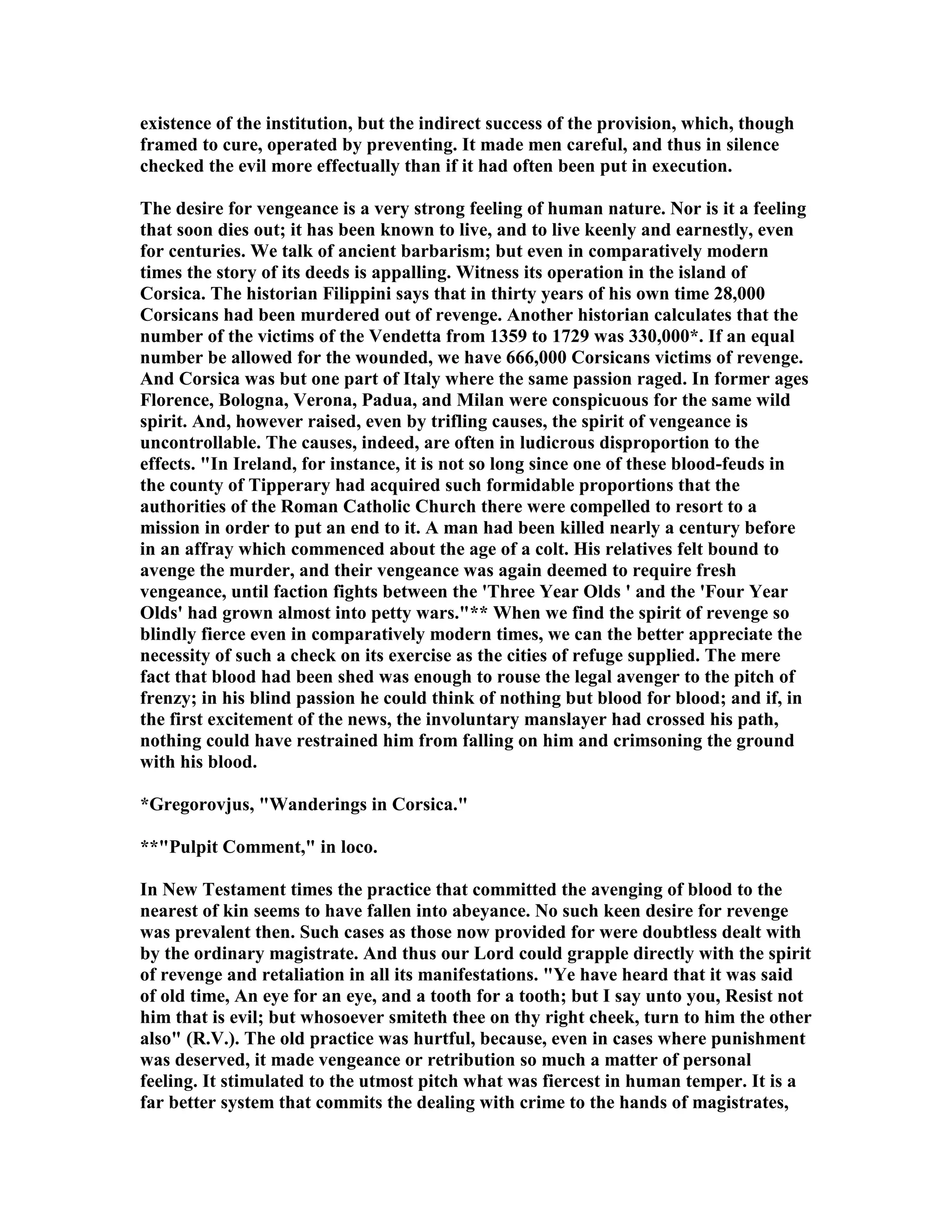
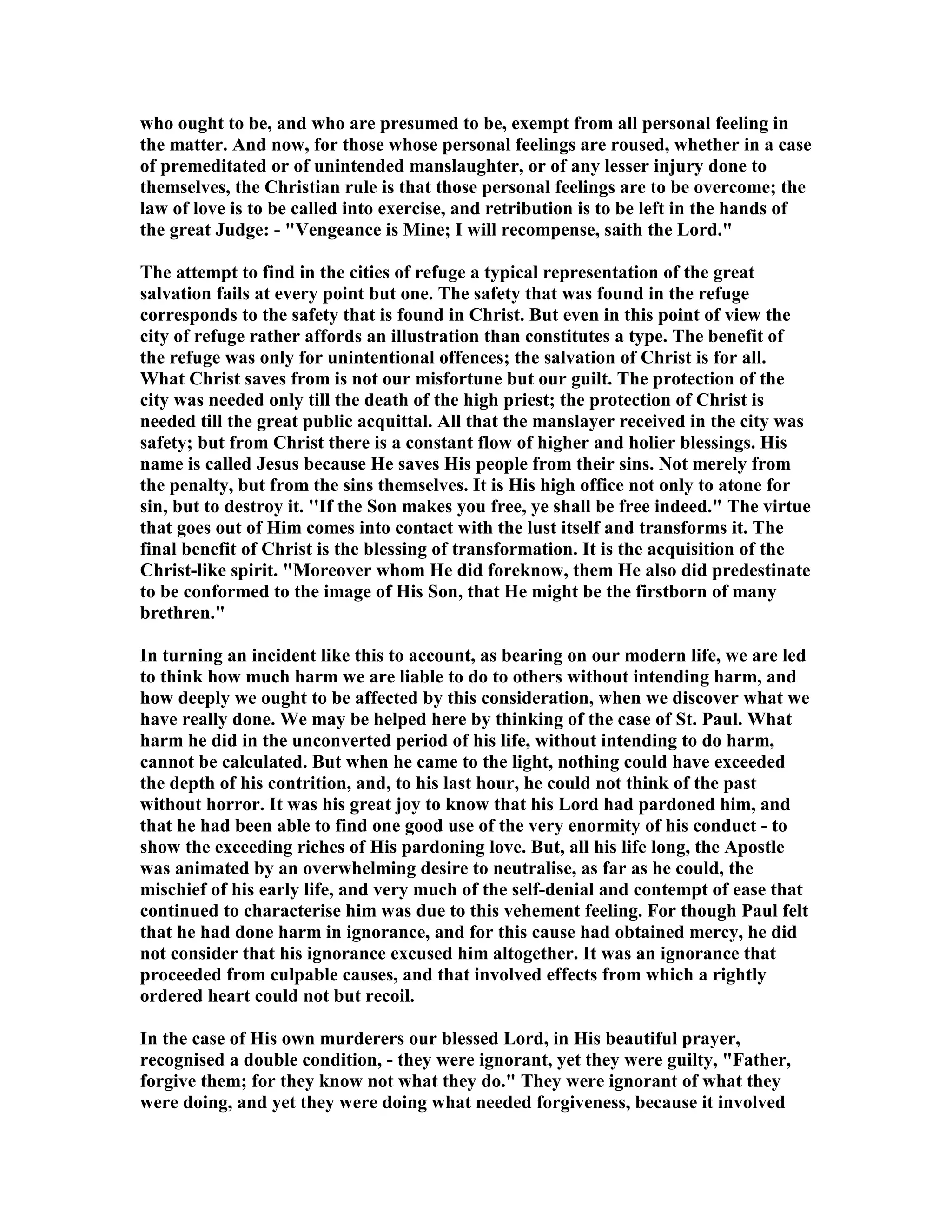
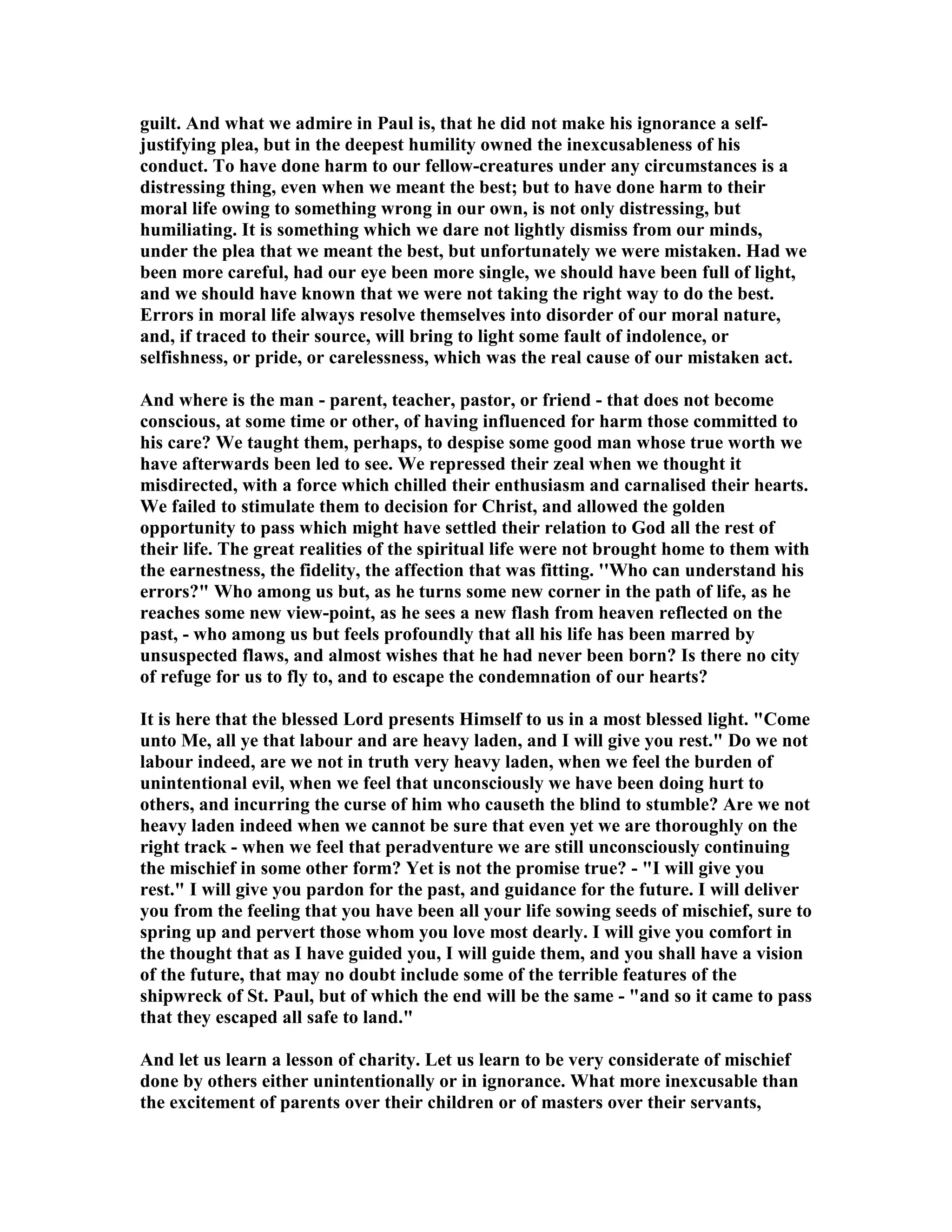
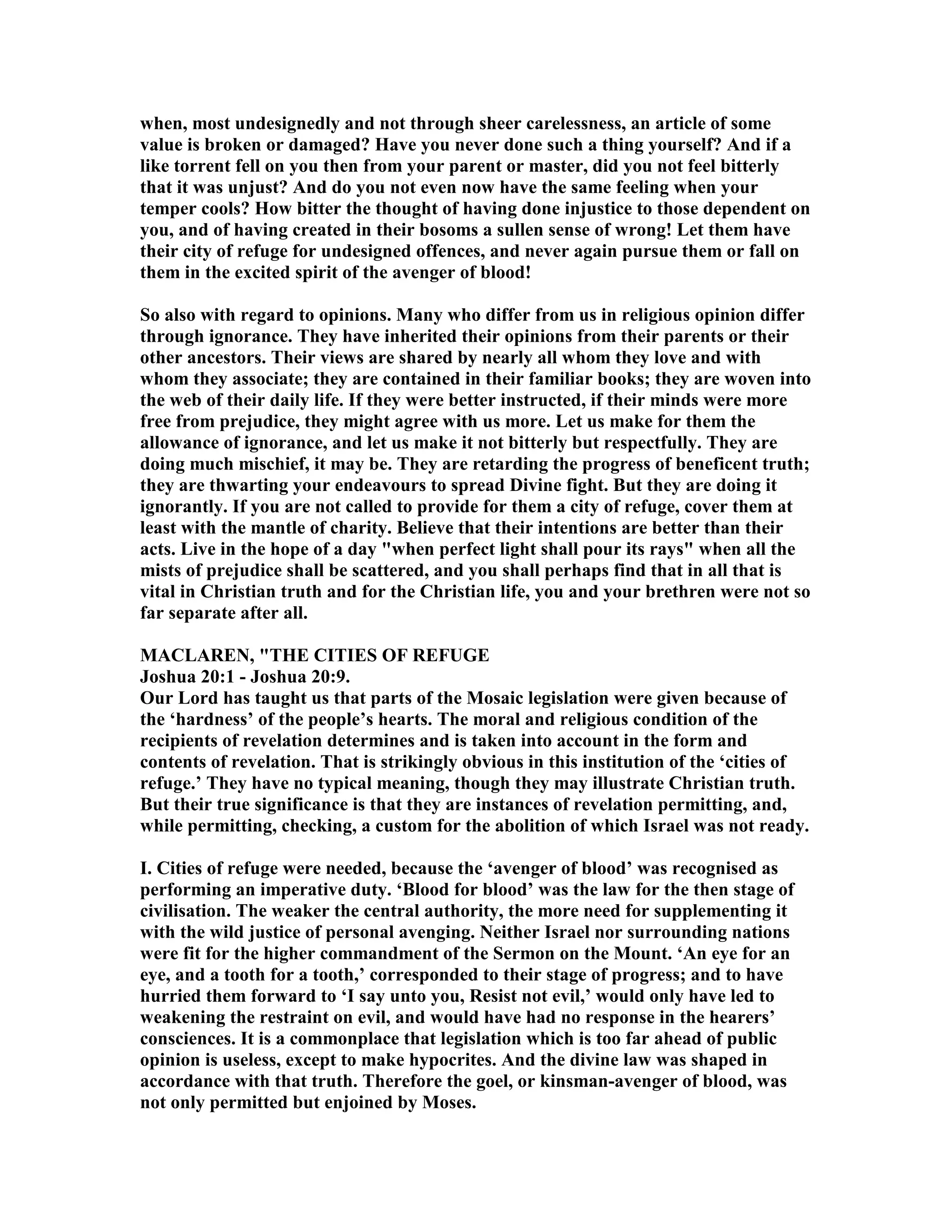


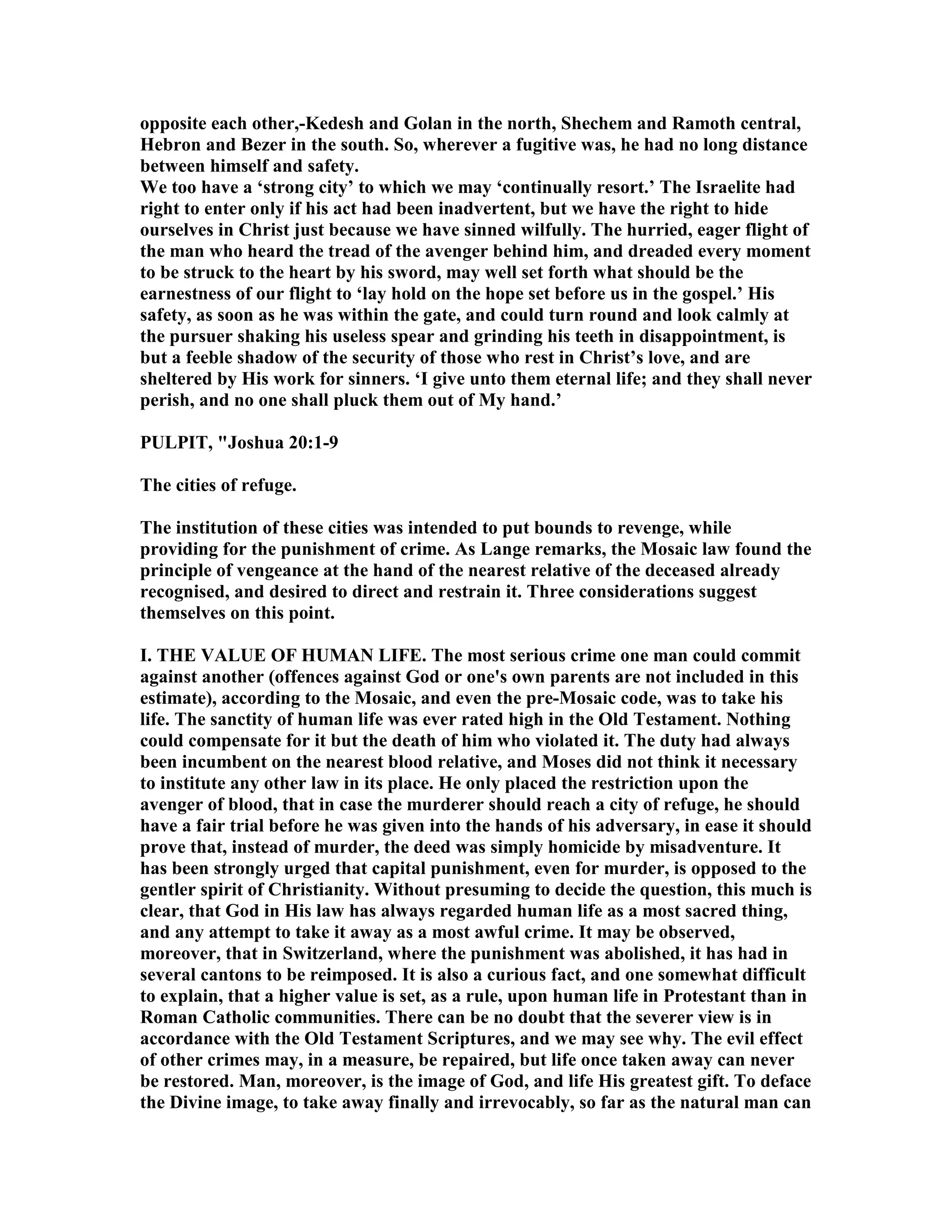
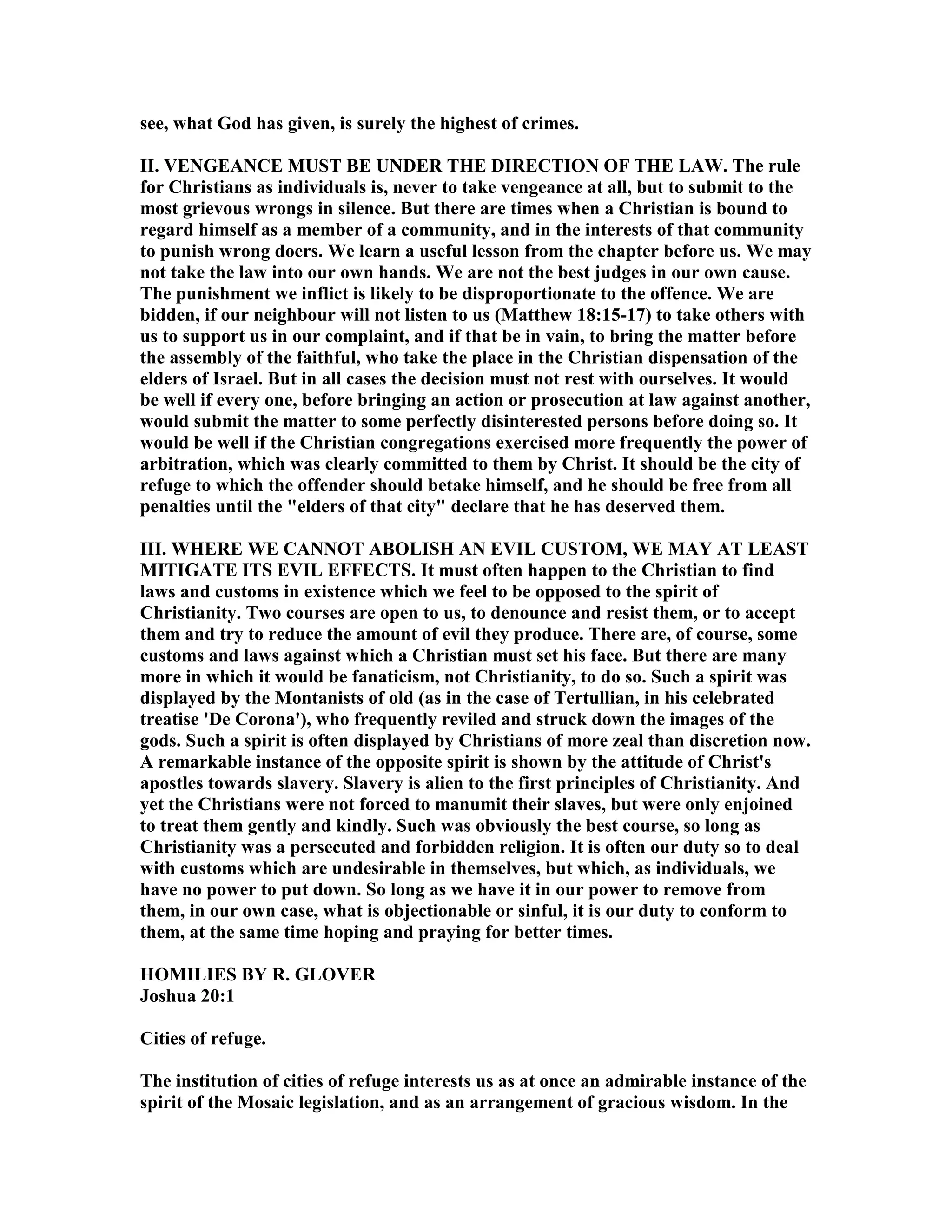





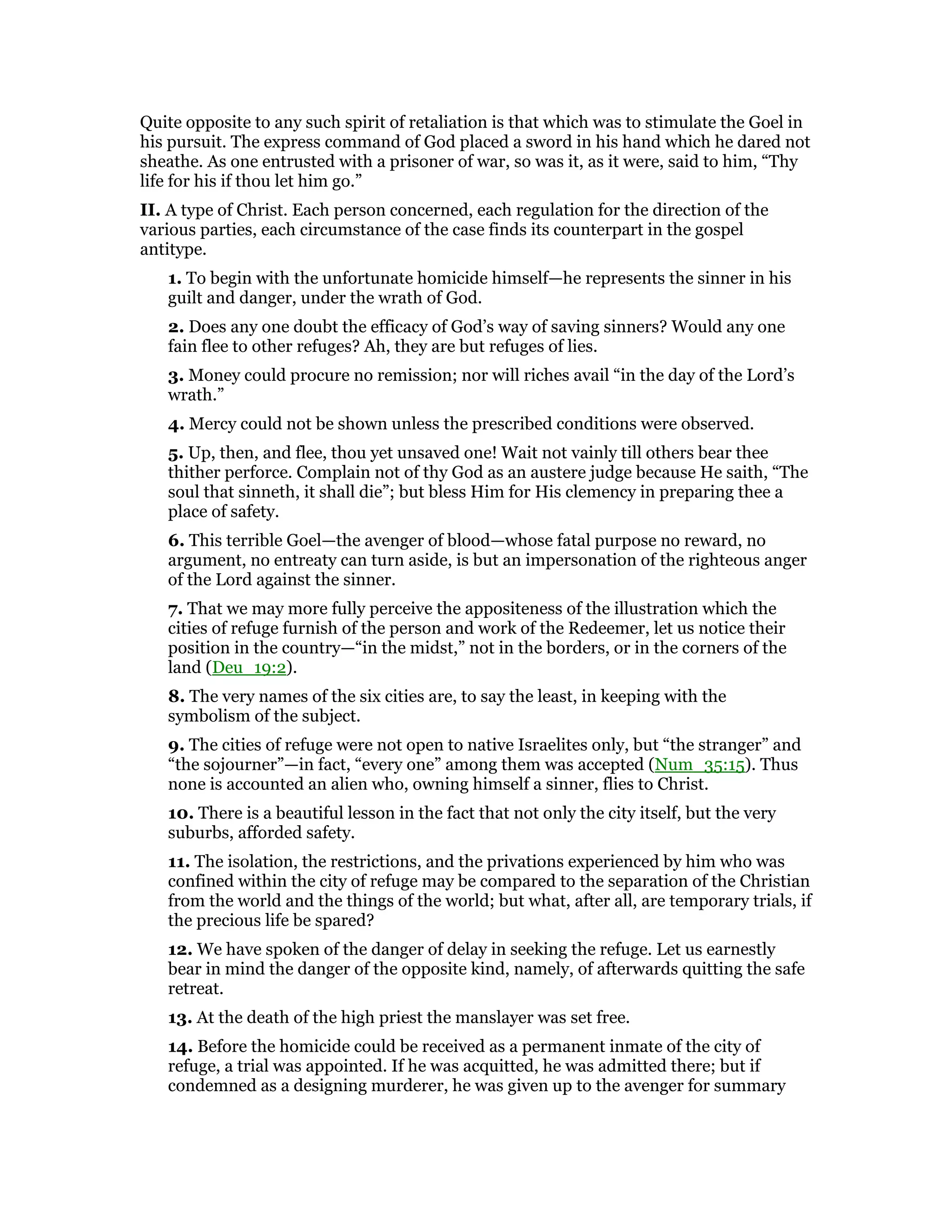
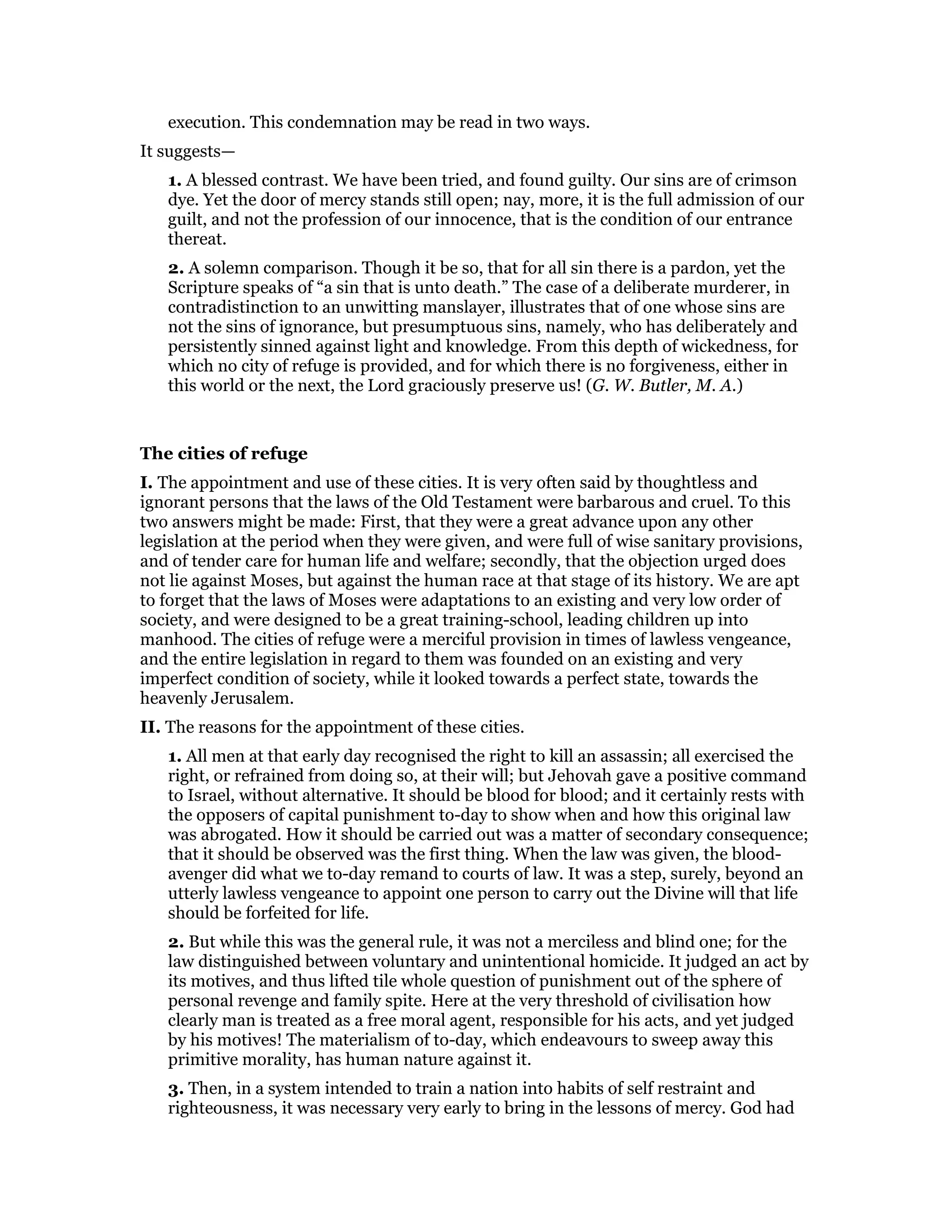

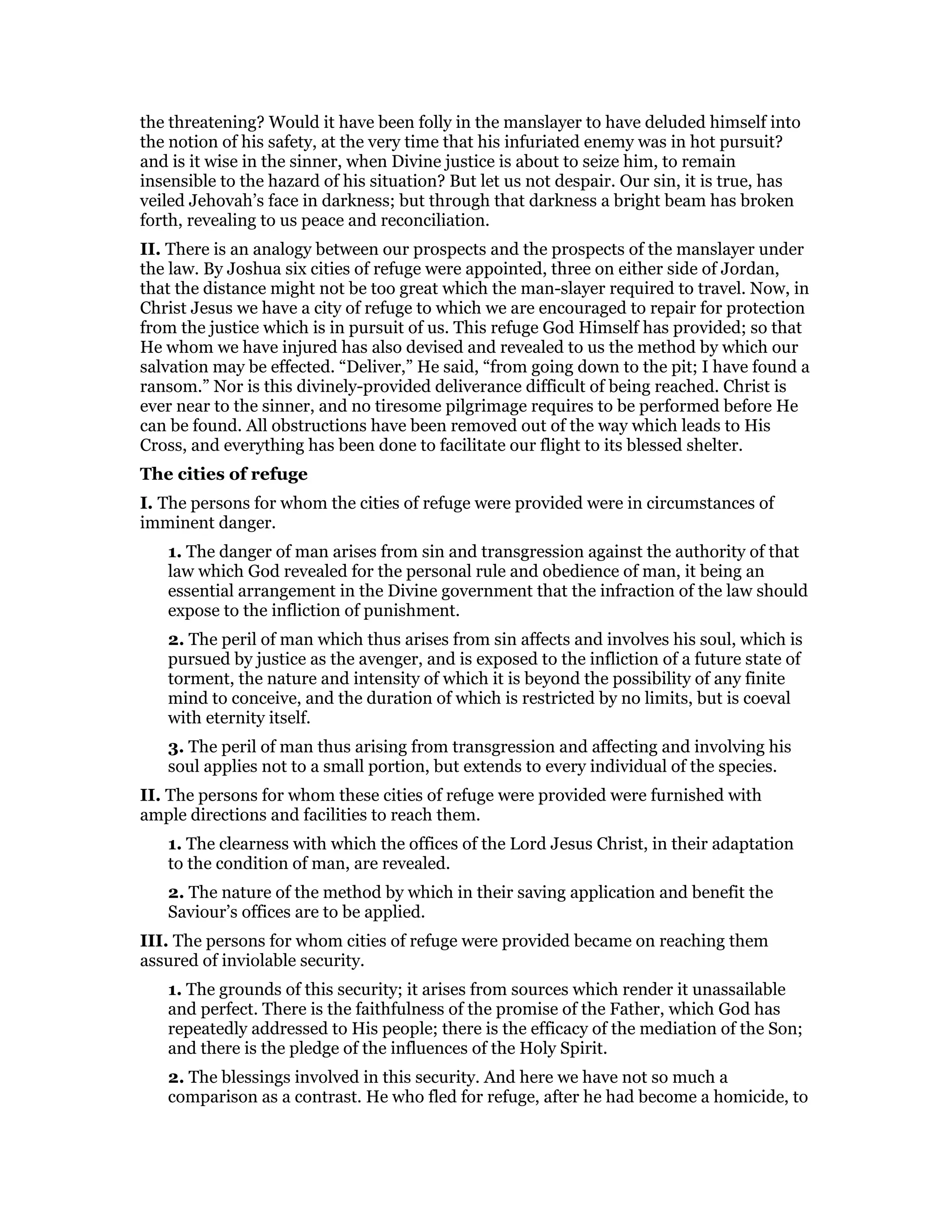
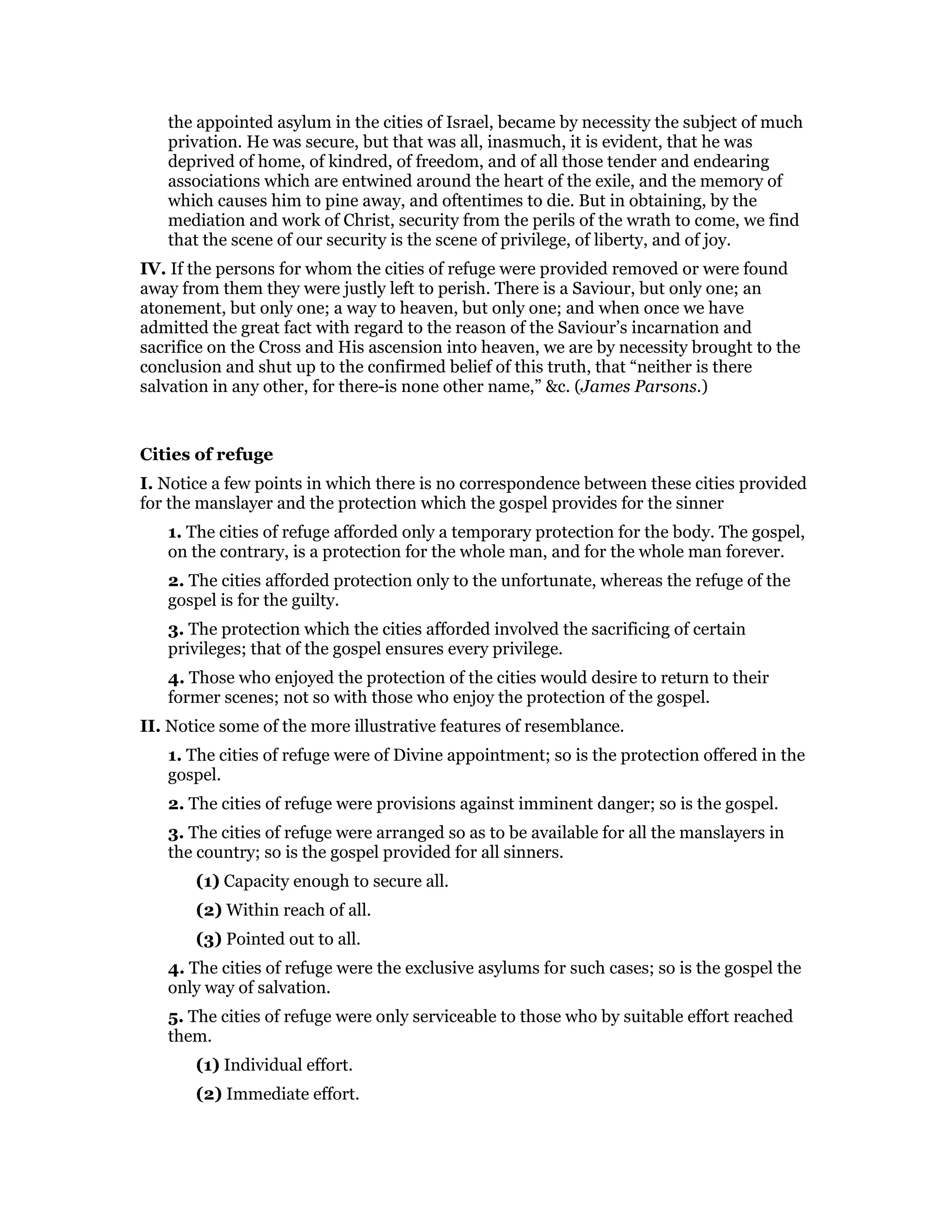

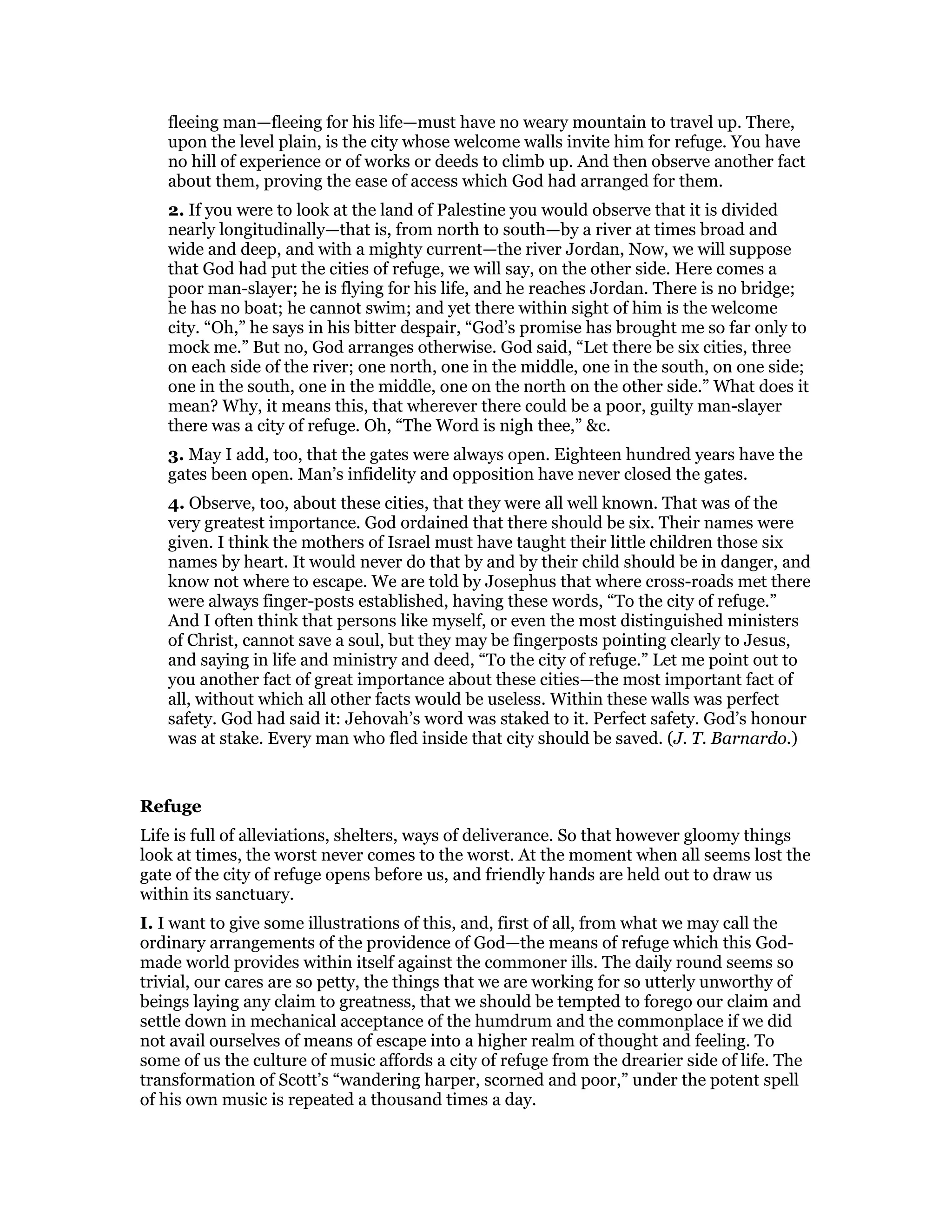
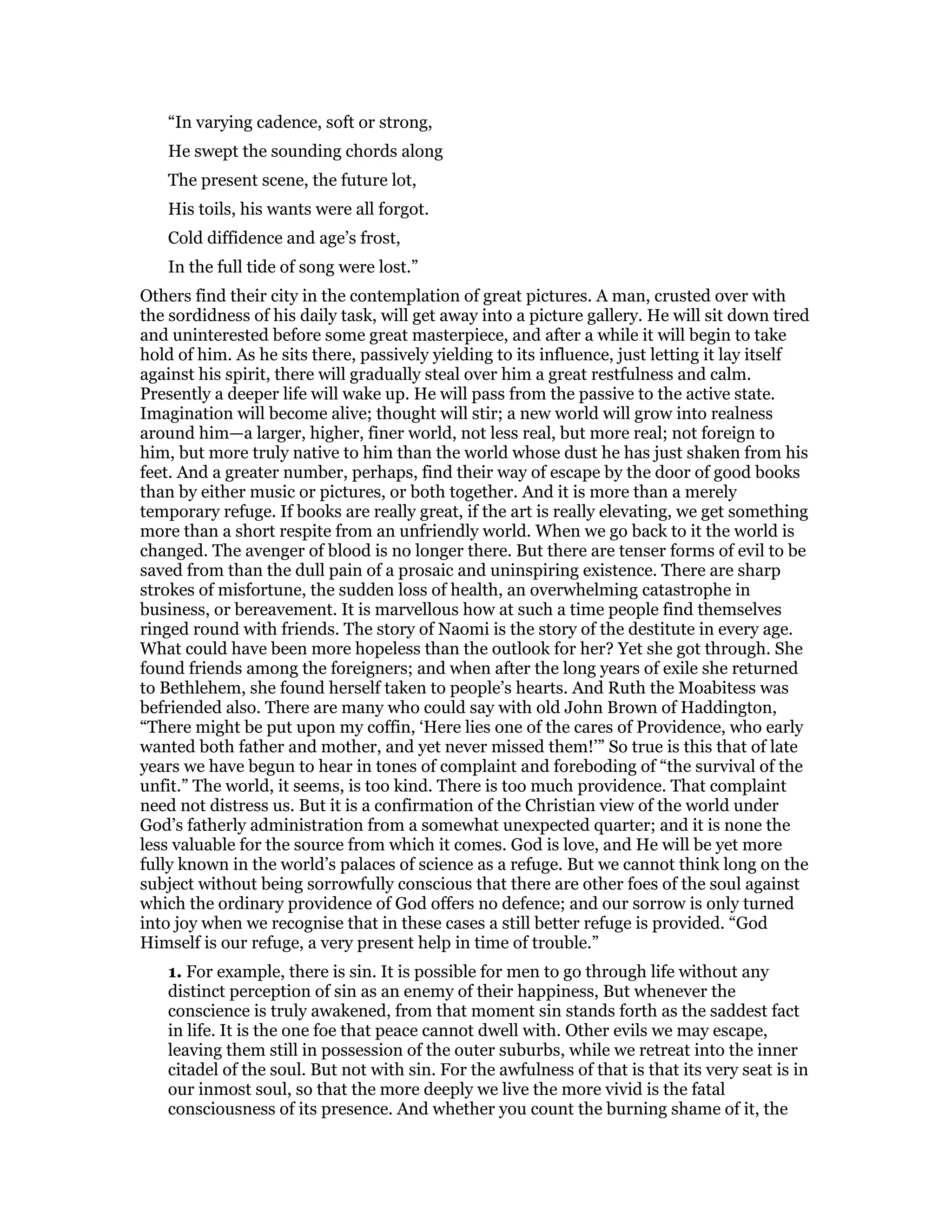
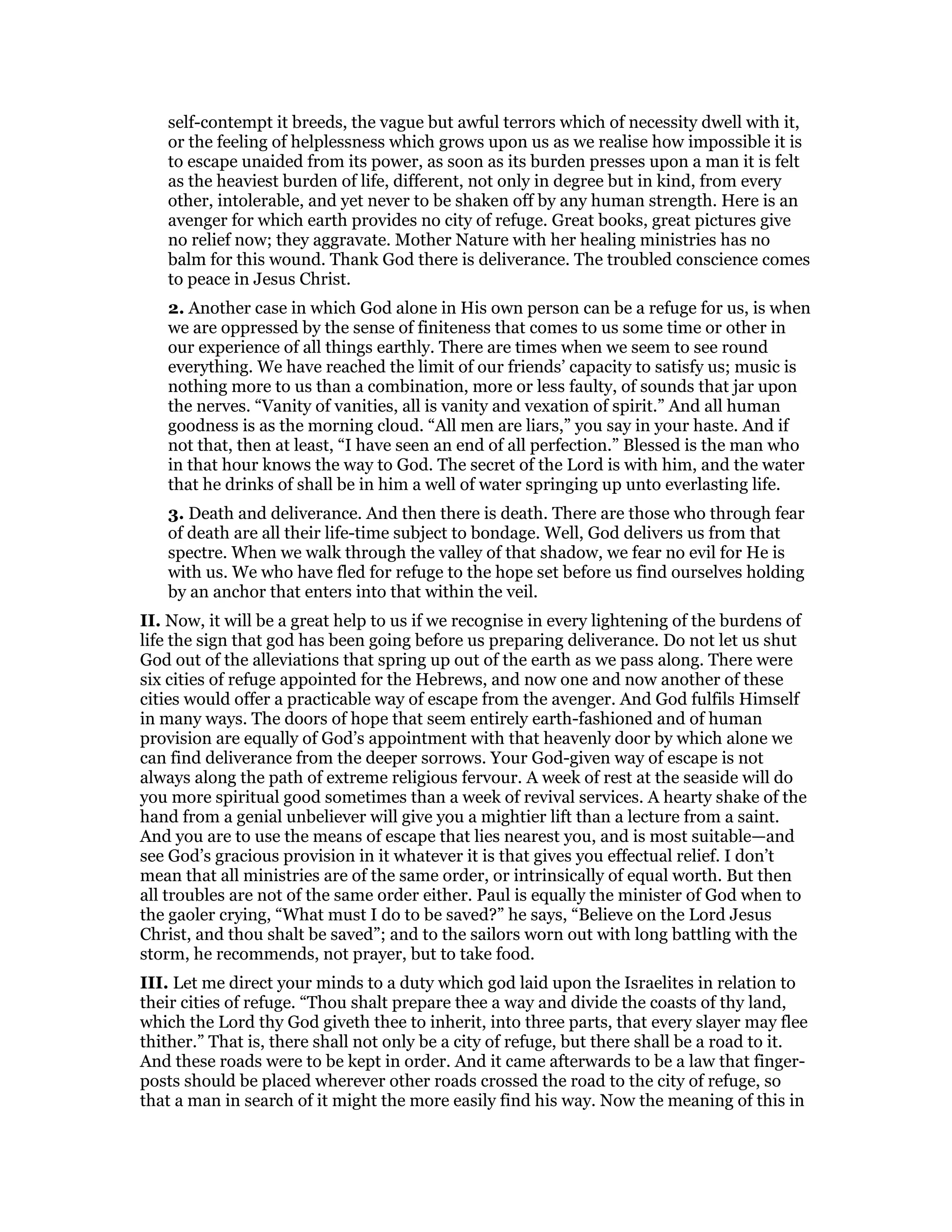



![appoint out for you cities of refuge; of the name, nature, use, and number of these
cities; see Gill on Num_35:6,
whereof I spake unto you by the hand of Moses: Num_35:1.
TRAPP, "Joshua 20:2 Speak to the children of Israel, saying, Appoint out for you
cities of refuge, whereof I spake unto you by the hand of Moses:
Ver. 2. Speak unto the children of Israel.] They had been spoken to before by Moses
to do thus but made no haste to do it: such is men’s slackness in procuring the good
of others.
Appoint out for you cities of refuge.] Susceptionis aut recollectionis, for the
preservation of man’s precious life, if causelessly sought after: not such sanctuaries
of roguery as Romulus opened about the beginning of his reign to bring more
company about him: nor as the Romanists now-a-days do for wilfnl murderers and
other wicked persons, who should be pulled from the altar to the halter, as Joab
was. See Exodus 21:14. If a malefactor be going to execution, and a cardinal meeting
him put his red hat upon his head, he is thereby free immediately, Proh nefas! The
scripture saith, "A man that doeth violence to the blood of any person shall flee to
the pit; let no man stay him." [Proverbs 28:17] But the Pope professeth to have
power to dispense against the ew Testament and the Old: which made Sir Walter
Raleigh say, that if he were to choose a religion for licentious liberty, he would
become a Papist.
3 so that anyone who kills a person accidentally
and unintentionally may flee there and find
protection from the avenger of blood.
GILL, "That the slayer that killeth any person unawares, and unwittingly,
may flee thither,.... Who through mere accident, and without design, killed a person,
friend or foe, one of his own kindred, or a stranger, without any malice against him, or
intention to take away his life:](https://image.slidesharecdn.com/joshua20commentary-160726122214/75/Joshua-20-commentary-38-2048.jpg)
![and they shall be your refuge from the avenger of blood; from any of the
relations of the deceased, who might be stirred up to avenge the blood of his kinsman on
the slayer; see Num_35:12.
BE SO ,"Joshua 20:3. Unwittingly — Hebrew, Through ignorance, or error, or
mistake, and without knowledge. The same thing is twice repeated, to cut off all
expectations that wilful murderers might have of protection here. God having
declared that such should be taken even from his altar, that they might be killed. It
is strange that any Christians should make their sanctuaries give protection to such
persons whom God hath so expressly excepted from it! Avenger — The nearest
kinsman, who had right or power to demand or take vengeance for the slaughter.
WHEDO ,"3. Unawares and unwittingly — The design of the city of refuge was not
to screen criminals, but to afford an opportunity to all accused of so grave a charge
to show the absence of a guilty intent. In order to do this the guilty must be
temporarily received as well as the innocent.
Avenger of blood — The next of kin, or the Goel, as he is styled in the Hebrew, and
still called in the East. In Genesis 9:5, Jehovah says, “Your blood in return for the
lifeblood which you have shed will I require.” He here expresses his estimate of the
sacredness of human life. The avenger of blood is his agent for searching out and
punishing murder. In the absence of magistrates and tribunals, one man in each
family was required to act as a sheriff for the redress of his kindred and the
protection of the body politic. In ancient Greece the land was regarded as defiled
and accursed of the gods so long as a murderer dwelt therein unpunished.
TRAPP, "Verse 3
Joshua 20:3 That the slayer that killeth [any] person unawares [and] unwittingly
may flee thither: and they shall be your refuge from the avenger of blood.
Ver. 3. That killeth any person unawares and unwittingly.] ot presumptuously,
with a high hand, and of forethought malice; but either by chance medley, as they
call it, or in his own necessary defence, when he must either kill or be killed, and he
cannot avoid it. For that tenet of Soto is false, Defensio cum interfectione est licita,
quia fuga est ignominiosa.
PULPIT, "Joshua 20:3
Unawares and unwittingly. Literally, in error, in not knowing. umbers 35:16-18
and Deuteronomy 19:5, give a clear explanation of what is here meant. Knobel
notices that the first of these expressions is found in Le Deuteronomy 4:2, and the
second in Deuteronomy 4:42. The latter is "superfluous," and therefore a "filling up
of the Deuteronomist." The "Deuteronomist" must have been very active in his
"filling up." If he were really so lynx-eyed in a matter of style, it is a wonder that he
was so careless, as we are told he is, in matters of fact. To more ordinary minds it
would seem as if the author, familiar with the books of Moses, was quoting](https://image.slidesharecdn.com/joshua20commentary-160726122214/75/Joshua-20-commentary-39-2048.jpg)
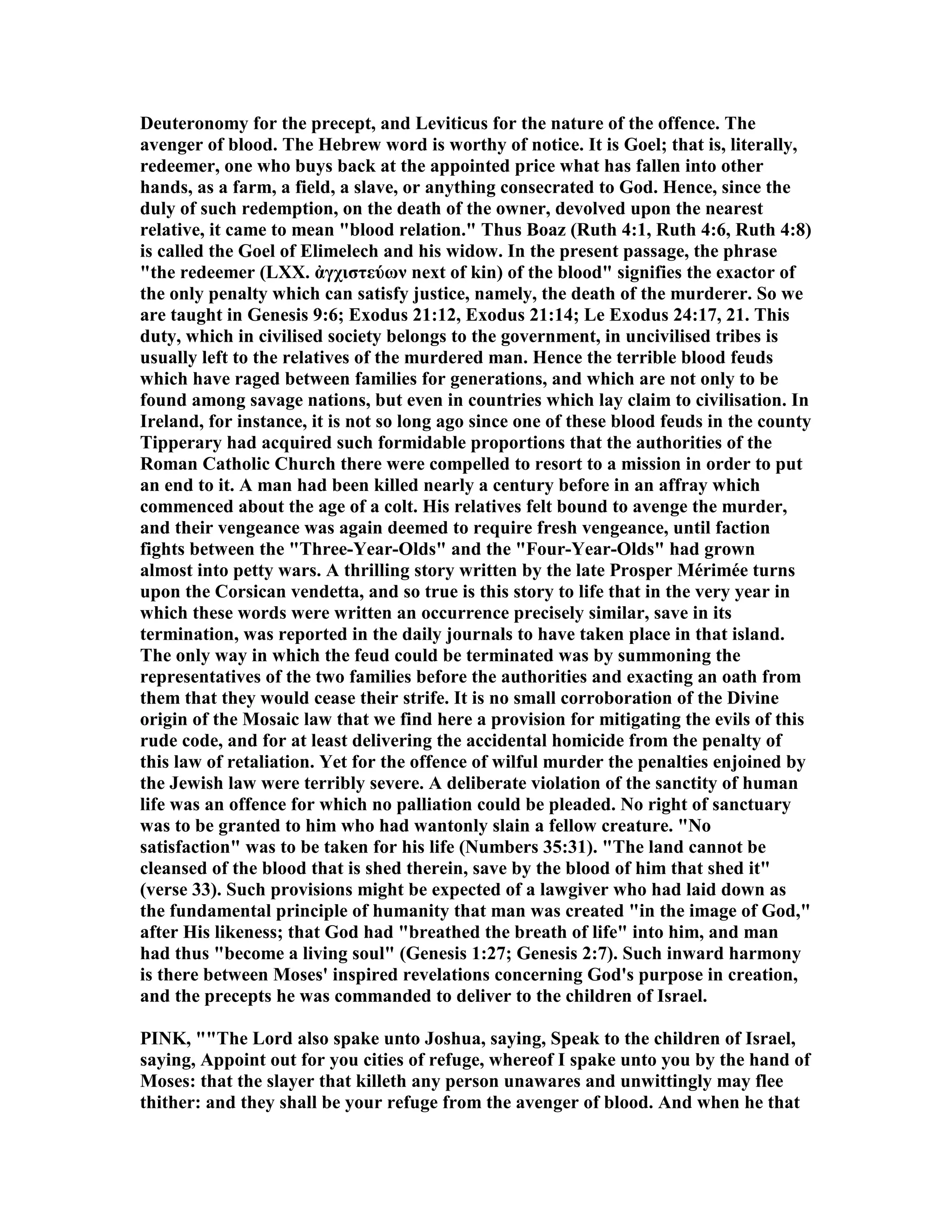
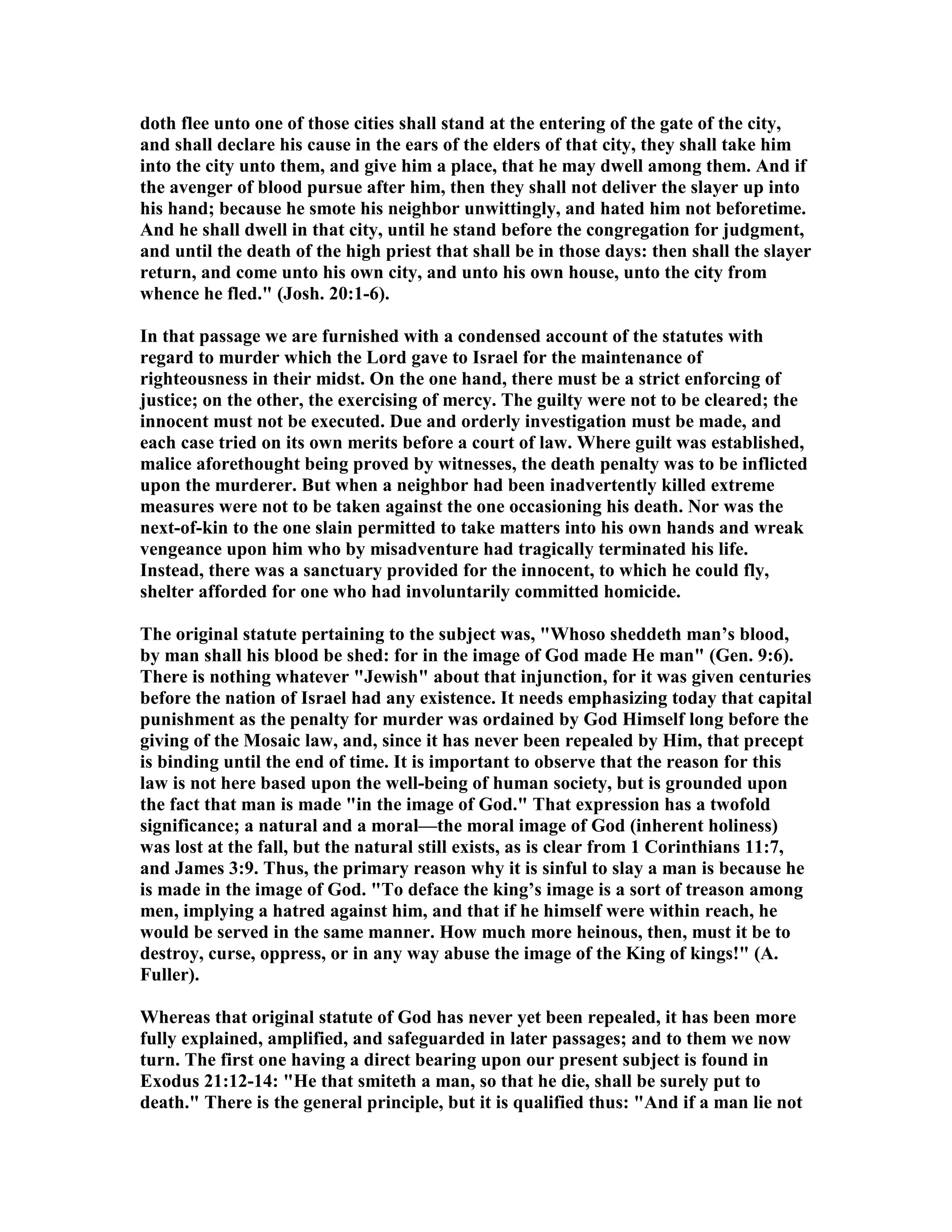
![in wait, but God deliver him into his hand, then I will appoint thee a place whither
he shall flee. But if a man come presumptuously upon his neighbor, to slay him with
guile; thou shalt take him from Mine altar, that he may die." A sharp distinction
was thus drawn between deliberate murder and involuntary manslaughter. In the
former instance, when one smote his fellow intentionally, whether from
premeditated malice or in the heat of sudden passion, so that he expired from the
injury, then the deed must be regarded as murder, and the death penalty be
enforced. But where one unwittingly and unwillingly inflicted an injury upon
another, even though it proved to be a fatal one, he was not to be executed for the
act. Instead, there was a place appointed by God to which he might flee, and where
he could be sheltered from any who sought vengeance upon him.
We have been much impressed by the fact that the above passage is found in the
very next chapter after the one which records the Ten Commandments. Let those
who have such a penchant for drawing invidious and odious comparisons between
that which obtained under the old covenant and that which pertains to the new take
careful note that this gracious provision was made by God under that very economy
which dispensationalists are so fond of terming "a forbidding and unrelieved regime
of stern law." It was nothing of the kind, as any impartial student of the Word is
aware. In all ages God has tempered His justice with mercy and caused His grace to
reign through righteousness. Let it not be overlooked that such declarations as the
following are found in the Old Testament scriptures. "Like as a father pitieth his
children, so the Lord pitieth them that fear Him" (Ps. 103:13). "Great are Thy
tender mercies, O Lord" (Ps. 119:156). The putting forth of His wrath is spoken of
as His "strange work" (Isa. 28:21). "Thou art a God ready to pardon, gracious and
merciful, slow to anger, and of great kindness" ( eh. 9:17). "He restraineth not His
anger for ever, because He delighteth in mercy" (Mic. 7:18), and most evidently did
the cities of refuge testify to that fact.
Ere passing on from Exodus 21:13, 14, let us also duly attend to the wording of verse
13. It is not "And if a man lie not in wait, but accidentally slay another," but
instead, "And if a man lie not in wait [having no intention to injure his neighbor],
but God deliver him into his hand." In full accord with the uniform teaching of
Holy Writ concerning the Divine superintendence of all events, such a calamity as is
here supposed is not ascribed to "chance" or "ill fortune" (for there is nothing
fortuitous in a world governed by God), but instead is attributed to an act of God—
i.e., the Lord being pleased to take away in that manner the life which He had given.
"Unto God the Lord belong the issues from death" (Ps. 68:20). The gates of the
grave open unto none except at the command of the Most High, and when He gives
the word none can withstand it. "My times [to be born and to die: Ecclesiastes 3:2]
are in Thy hand" (Ps. 31:15), and not in my own. "Seeing his days are determined,
the number of his months are with Thee, Thou hast appointed his bounds that he
cannot pass" (Job 14:5). ot only is the hour of death Divinely decreed, but the
form in which it comes. "Then the Jews took up stones again to stone Him" (John
10:31), but in vain, for God had ordained that He should be crucified. o matter in
what manner death comes, it is the Lord who kills and "bringeth down to the
grave" (1 Sam. 2:6).](https://image.slidesharecdn.com/joshua20commentary-160726122214/75/Joshua-20-commentary-42-2048.jpg)
!["And the Lord spake unto Moses, saying, Speak unto the children of Israel, and say
unto them, When ye be come over Jordan into the land of Canaan; then ye shall
appoint you cities to be cities of refuge for you; that the slayer may flee thither,
which killeth any person at unawares" ( um. 35:9-11). That which is mentioned in
Exodus 21 had reference to God’s merciful provision for Israel during the time they
remained in the wilderness. There was, even then, "a place" appointed by the Lord
to which the manslayer might turn for sanctuary. We are not told where that place
was. Some of the ancient Jewish writers suppose that it was located "outside the
camp," but, since all the cities of refuge were cities which pertained to the Levites,
we consider it more in keeping with the Analogy of Faith to conclude that the
"place" was within that part of the camp assigned to the priests. That temporal
provision wag to give way to a more permanent arrangement after the children of
Israel became settled in their inheritance.
"And of these cities which ye shall give six cities shall ye have for refuge. Ye shall
give three cities on this side Jordan, and three cities shall ye give in the land of
Canaan, which shall be cities of refuge" ( um. 35:13, 14). Two and a half of the
tribes, namely the children of Gad, the children of Reuben, and half the tribe of
Manasseh, had been assigned their place and portion on the eastern side of the
Jordan ( um. 32:33), in the fertile valley which had been occupied by Sihon king of
the Amorites and Og king of Bashan, who, refusing Israel’s request to pass through
that country, had been slain in battle and their territory seized by the conquerors
( um. 21:21-31). The remaining three were to be situated in convenient sections in
Palestine, where they would be accessible at short notice unto those who might have
need of the same. or was their use restricted to those who were of the natural seed
of Abraham: "These six cities shall be a refuge, both for the children of Israel, and
for the stranger, and for the sojourner among them: that every one that killeth any
person unawares may flee thither" (v. 15). Thus, even under the Mosaic economy,
Divine mercy was extended unto those who threw in their lot with the people of
God!
In the verses that follow various cases are described in detail, so that there might be
no miscarriage of justice when the magistrates were adjudicating thereon: "And if
he smite him with an instrument of iron, so that he die, he is a murderer: the
murderer shall surely be put to death. And if he smite him with throwing a stone,
wherewith he may die, and he die, he is a murderer: the murderer shall surely be
put to death. Or if he smite him with an hand weapon of wood, wherewith he may
die, and he die, he is a murderer: the murderer shall surely be put to death. The
revenger of blood himself shall slay the murderer: when he meeteth him he shall
slay him. But [or "and"] if he thrust him of hatred, or hurl at him by laying of wait,
that he die; or in enmity smite him with his hand, that he die: he that smote him
shall surely be put to death; for he is a murderer: the revenger of blood shall slay
the murderer, when he meeteth him" (vv. 17-21). Thus those cities of refuge were
not meant to afford shelter for murderers as such. Therein they differed noticeably
from the sacred precincts of the heathen gods, which provided a safe asylum for any
violent or wicked man. The Divine statute insisted on the sanctity of life and the](https://image.slidesharecdn.com/joshua20commentary-160726122214/75/Joshua-20-commentary-43-2048.jpg)

![I the Lord dwell among the children of Israel" ( um. 35:33, 34). Such shedding of
blood not only defiles the conscience of the murderer, who is thereby proved not to
have eternal life abiding in him (1 John 3:15), but also pollutes the land in which the
crime was committed, being abominable to God and to all good men. or can that
land be cleansed from the blood of murder but by executing condign judgment upon
the murderer himself. Thus we are informed that there was far more involved in the
enforcing of these statutes than the maintenance of righteousness between man and
man. As another has pointed out, "the glory of God, the purity of His land, and the
integrity of His government, had to be duly maintained. If those were touched, there
could be no security for anyone."
The same things are taught, substantially, in the ew Testament, particularly in
Romans 13:1-4. There the civil ruler or magistrate is twice denominated "the
minister of God": first, in protecting the law-abiding; second, in penalizing the law-
defiant. He is Divinely appointed to maintain civic righteousness, for if the restraints
of government be removed, a state of anarchy and bedlam at once ensues. The
"sword" is the symbol of the ultimate power of life and death (Gen. 3:24; Zechariah
13:7), and the "he beareth not the sword in vain" signifies that God has invested
him with the authority to inflict capital punishment—the common method of which
in olden times was by decapitating with the sword. It is an essential part of the
governor’s office to be "a revenger, to execute [God’s] wrath upon him that doeth
evil." othing is said about its being his duty to reform criminals, rather is it his
business to redress wrongs and to instill fear into those who contemplate doing
wrong. Romans 13:1-4, is silent upon any efforts being required to reclaim the
refractory, the emphasis being placed upon his alarming them and imposing the full
penalty of the law: compare 1 Peter 2:14. It is a sure sign of a nation’s moral
degeneracy, and a dishonoring and incurring of God’s displeasure, when capital
punishment is abolished, or magistrates become lax and yield to sentimentality.
Reverting to the case of the one who is not guilty of deliberate murder, there are
four other details which require to be noticed. First, when one unintentionally killed
a neighbor, there must usually have been in such cases a culpable degree of
carelessness, and therefore, though his life was spared, his freedom was curtailed.
Second, accordingly he was required to leave his home and family, and take up
residence in the city of refuge. Third, if he forsook that city, he forfeited legal
protection, and then, should the revenger of blood find him without its borders, he
was entitled to kill him ( um. 35:27). Fourth, it was required that he remain within
the city of refuge until the death of the high priest, and then he was free to return to
his home and reside there unmolested (v. 28). By limiting the time of his banishment
by the high priest’s death, honor was put upon the priesthood—as it had been in
selecting those cities, for they all belonged to the Levites. "The high priest was to be
looked upon as so great a blessing to his country, that when he died their sorrow
upon that occasion should swallow up all other resentments" (Matthew Henry).
Further reference is made to our subject in Deuteronomy 4:41-43, wherein we see
illustrated the law of progressive development. First, bare mention of an unspecified
"place" is referred to (Ex. 21:13). ext, instructions are given for the appointing of](https://image.slidesharecdn.com/joshua20commentary-160726122214/75/Joshua-20-commentary-45-2048.jpg)


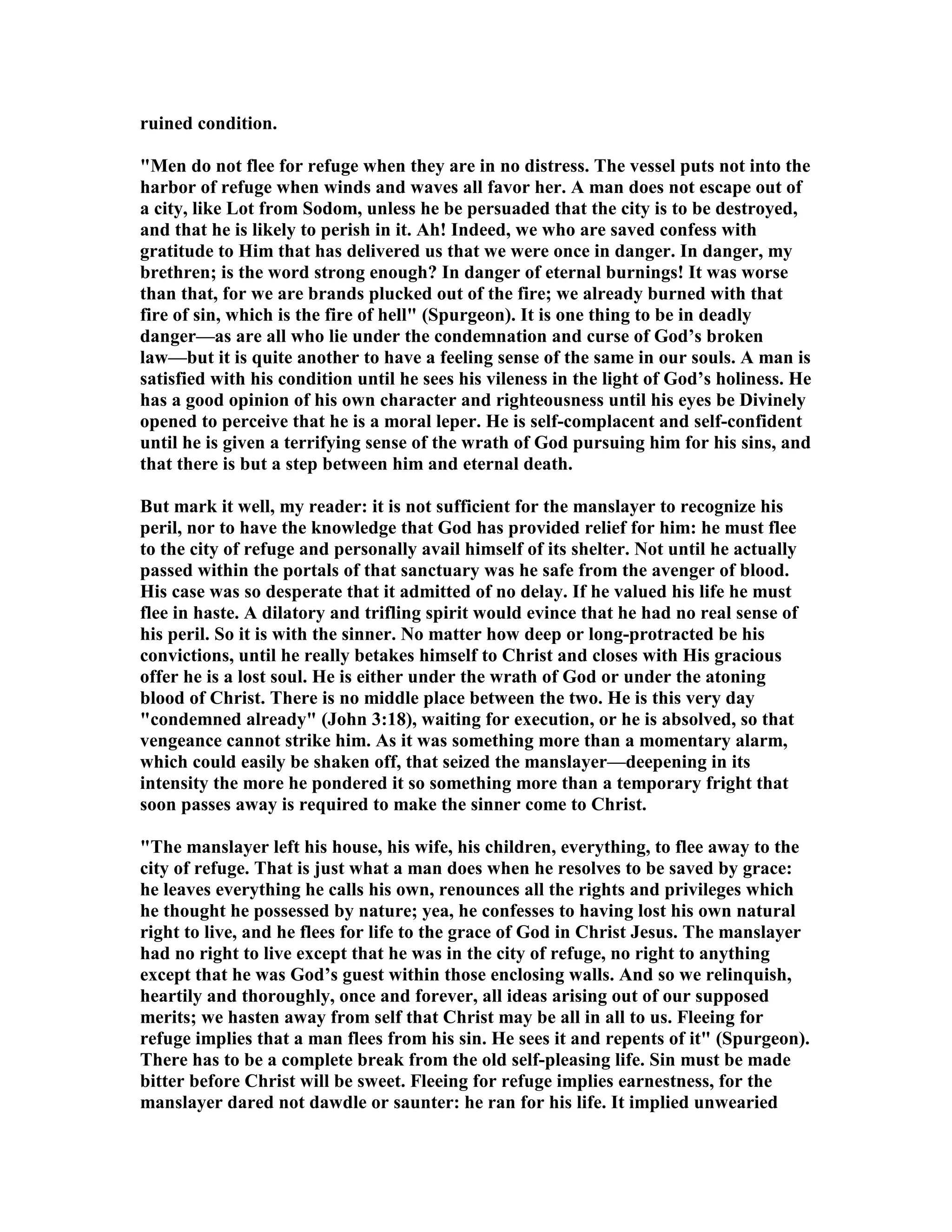

![outstanding feature in this lovely evangelical picture. Sought by one who was
determined to execute judgment upon him, the manslayer turned unto this haven of
peace. To attempt to brazen things out was futile: equally so is it for the sinner to
imagine he can successfully defy Him whose justice is even now pursuing him. Thus
there was no other alternative but death. In like manner " either is there salvation
in any other: for there is none other name under heaven given among men, whereby
we must be saved" (Acts 4:12). To delay was madness: "he shall flee unto one of
those cities, and live" (Deut. 19:5) was the peremptory requirement. It was
dangerous for Lot to linger in Sodom, lest fire and brimstone destroy him (Gen.
19:17). So God bids us, "Today if ye will hear His voice, harden not your hearts"
(Heb. 3:7, 8).
3. Those cities were placed on an eminence, being built upon hills or mountains, as
several of their names and the locations of others plainly intimate. This made them
the more readily seen and kept in sight by those who were fleeing to the same. As
such they blessedly prefigured Him whom "God exalted with His right hand to be a
Prince and a Savior, for to give repentance to Israel, and forgiveness of sins" (Acts
5:31). So too when the Gospel is faithfully preached the antitypical Refuge is held
forth, so that it may be said of the hearers, "before whose eyes Jesus Christ hath
been evidently [plainly] set forth" (Gal. 3:1). For the same reason, the ministers of
Christ who lift Him before their congregations are likened to "a city that is set on an
hill" (Matthew 5:14).
4. The road to the city was plainly marked out. "Thou shalt prepare thee a way . . .
that every slayer may flee thither (Deut. 19:3). Jewish writers say it was a law in
Israel that one day in every year there were persons sent to repair the roads leading
to them, to remove all stumbling-stones which might by time have fallen in the way,
and to see also that the signposts which were set up at every corner leading to the
city were carefully preserved, and the name Miklac (that is, refuge) legible upon
them. Whether or not that was the case, certain it is that in the Gospel God has fully
and plainly made known the way of salvation, so that "wayfaring men, though fools,
shall not err therein" (Isa. 35:8). See also Romans 10:6-8.
5. They were easy of access. Those cities were so situated that when a person had
need of such, one was near at hand. Express instructions were given that they were
to be "in the midst of the land" (Deut. 19:2, 3), and not in remote corners which had
been difficult to approach. The land had to be divided "into three parts," one city of
refuge in each, so that it could be reached within a single day’s journey, no matter
where the manslayer resided—what a touching proof of God’s tender mercy!
Everything was done to facilitate the homicide’s escape. The application is obvious:
"The Lord is nigh unto them that are of a broken heart" (Ps. 34:18). Unto such He
says, "My righteousness is near" (Isa. 51:5). The way to Christ is short: it is but a
simple renunciation of self and a laying hold of Him to be our all in all.
6. The city of refuge provided protection only for the homicide from the revenger of
blood. The deliberate murderer was excluded, to teach us that there is no salvation
in Christ for presumptuous sinners who still go on deliberately in their trespasses.](https://image.slidesharecdn.com/joshua20commentary-160726122214/75/Joshua-20-commentary-50-2048.jpg)


![and considerate was the provision made for the benefit of the accidental slayer of his
fellow-man.” — Bush. Infinitely greater pains has God taken to lead guilty souls to
the refuge of the atoning blood of Jesus Christ. He has opened this refuge, built a
highway to it from every human soul, sent his Spirit to enlighten every eye, and his
heralds to cry in every ear, “This is the way; walk ye therein.” This way is not for
the innocent but for the guilty.
PETT, "Verse 4
‘And he shall flee to one of those cities, and shall stand at the entering of the gate of
the city and declare his cause in the ears of the elders of that city, and they shall take
him into the city to them, and give him a place, that he might dwell among them.’
The man seeking refuge would come to the gate of the city. It was in the square just
inside the gate that all official public activity took place for it was the public meeting
place. There the elders of the city would hear his case, and if they were satisfied that
the man appeared innocent of deliberate murder, they would allow him in to take
refuge there, and provide somewhere for him to live. It would appear that houses
were assigned in such cities for such occasions.
The ‘elders of the city’ were the ruling men of the city who were also responsible for
justice. They were usually, although not always, older men. They were always men
of recognised status.
“They shall take him into the city to them.” The verb is used of a wife being taken
into a home (2 Samuel 11:27), and a forsaken child being taken in by God (Psalms
27:10). It contains an element of welcome and protection.
TRAPP, "Joshua 20:4 And when he that doth flee unto one of those cities shall
stand at the entering of the gate of the city, and shall declare his cause in the ears of
the elders of that city, they shall take him into the city unto them, and give him a
place, that he may dwell among them.
Ver. 4. And when he that doth flee unto one of these cities.] Which were to be cities
of Levites, who were presumed to be both wise and merciful men, and such as would
not favour wilful offenders. These cities also were to be at a just distance, that the
party might repair thereunto from all parts in due time. And lastly, a way thereunto
was to be paved, and marks of direction set up, as some note from Deuteronomy
19:2-3.
They shall take him into the city unto them.] God’s laws are not as Draco’s, that
punished every peccadillo almost with death; and were, therefore, said to be written
not with black but with blood. Howbeit that saying of King James is memorable,
that if God did allow him to kill a man, though by casualty or beside his intention,
he should think that God did not love him.](https://image.slidesharecdn.com/joshua20commentary-160726122214/75/Joshua-20-commentary-53-2048.jpg)
![5 If the avenger of blood comes in pursuit, the
elders must not surrender the fugitive, because
the fugitive killed their neighbor unintentionally
and without malice aforethought.
GILL, "And if the avenger of blood pursue after him,.... To the city of refuge,
whither he is fled, and demand him:
then they shall not deliver the slayer up into his hands; to be slain by him, but
shall protect him:
because he smote his neighbour unwittingly, and hated him not beforetime;
See Gill on Num_35:22; see Gill on Num_35:23, and See Gill on Deu_19:6.
PETT, "Verse 5
‘And if the avenger of blood pursue after him, then they shall not deliver the
manslayer up into his hand, because he smote his neighbour unwittingly, and did
not hate him beforehand.’
The man who escapes to a city of refuge and claims innocency of intent must be
protected until tried and only handed over to the avenger of blood if found guilty.
TRAPP, "Joshua 20:5 And if the avenger of blood pursue after him, then they shall
not deliver the slayer up into his hand; because he smote his neighbour unwittingly,
and hated him not beforetime.
Ver. 5. And if the avenger of blood pursue after him.] Sanguinem pro interfecto
posuit, saith Vatablus. If he in the heat of revenge, without taking leisure to consider
the fault as well as the fact, and the degree of it, &c., for all faults are not equal, as
the Stoics hold, neither are they to be alike punished. If the guilt of an evil
conscience pursue after us, as it will, let us run to Christ our rock of refuge, our
sanctuary of safety, and none shall be able to take us out of his hands: he and the
Father are one. [John 10:30]
PULPIT, "Joshua 20:5
And if. Or, "and when." Deliver. Literally, cause to shut up ( συγκλείσουσι, LXX),
implying the completeness of the deliverance, from which no escape was possible.](https://image.slidesharecdn.com/joshua20commentary-160726122214/75/Joshua-20-commentary-54-2048.jpg)
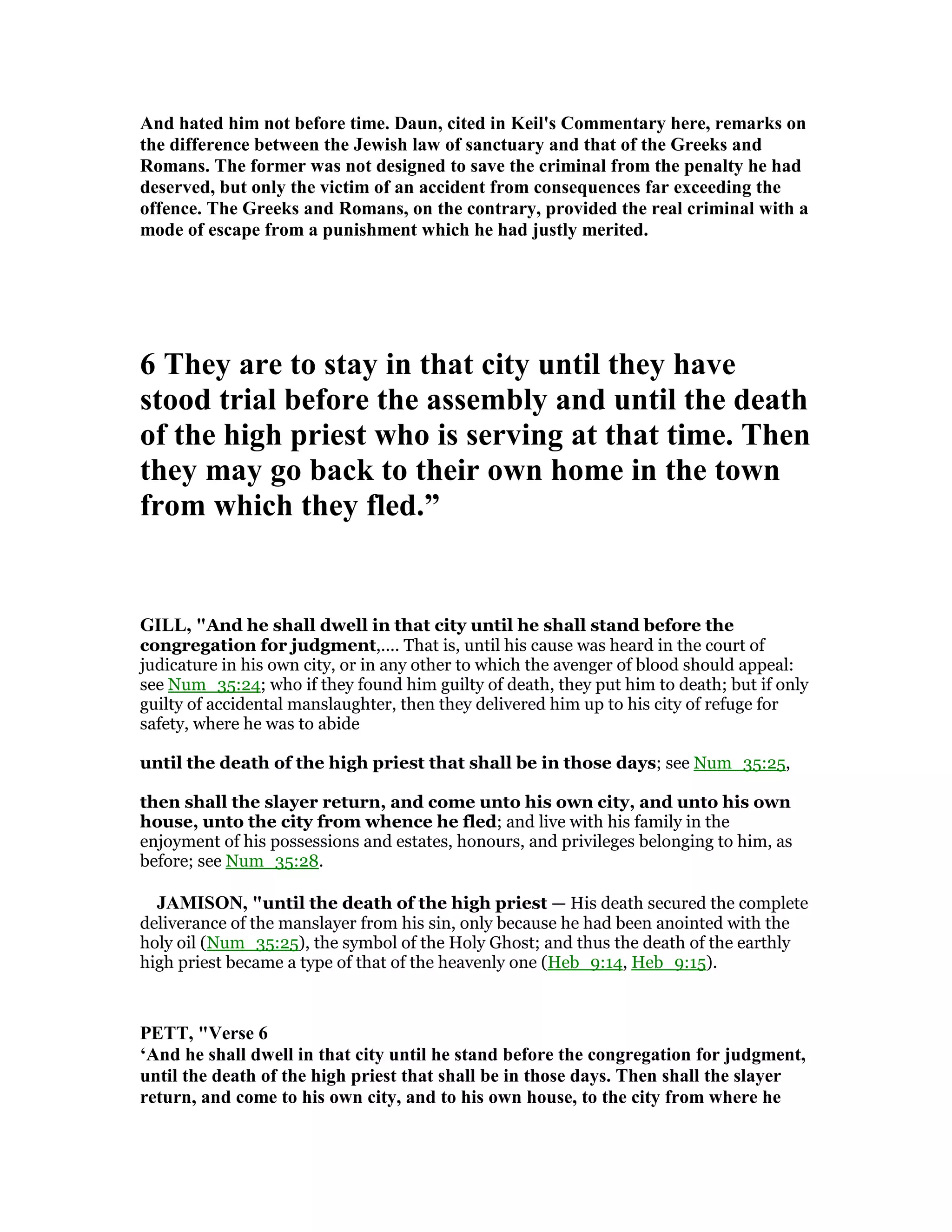

![proceeded from malice or was accidental. If he was condemned he was to be
executed; but if he was acquitted he was not set at liberty, but was sent back to live
in the refuge till the death of the High Priest. Here we see the superiority of this
system of protection over the pagan asylum of the altar, in the temple of some god,
which shielded the guilty and the innocent alike.
Until the death of the high priest — This does not mean that the death of the High
Priest takes place at the same time with the summons to trial. The only occasions on
which an innocent manslayer may leave the refuge are, 1st, temporarily, for a trial
where the manslaying occurred; and 2d, permanently, at the death of the High
Priest.
Why should he be released when the High Priest dies? Probably because he was
anointed as the representative and mediator of the people, who alone was able to
offer annual expiation for the whole people. His death, therefore, may be regarded
as an atonement prefiguring the death of our heavenly High Priest, who through the
eternal Spirit offered himself without spot unto God. Hebrews 9:14-15.
TRAPP, "Joshua 20:6 And he shall dwell in that city, until he stand before the
congregation for judgment, [and] until the death of the high priest that shall be in
those days: then shall the slayer return, and come unto his own city, and unto his
own house, unto the city from whence he fled.
Ver. 6. Until he stand before the congregation for judgment.] Until his cause be
tried, and the truth bolted out, that he may be cleared or doomed by the judges,
with the assent of the people, whose voice should be Currat lex, fiat iustitia, ruat
orbis.
Until the death of the high priest.] So long he shall live; in exile howsoever, because
he should have looked better to it, there having been some heedlessness in the
business. Besides, the high priest was amongst men the chief god upon earth, and so
the offence did chiefly strike against him: lest, therefore, such an offender should
happen to come into his presence, he might not be at liberty till the high priest’s
death. Philo saith that the high priest was not to behold at any time any mournful
object. Similarly among the Romans, Tiberius, counterfeiting grief for the death of
Drusus, had a veil laid betwixt the dead and him at the funeral, that he might not
see the body; because, forsooth, the high priest is a sacred thing, and the devil loveth
to be God’s ape. See on umbers 35:25.
PULPIT, "Until he stand before the congregation. That is, until he had had a fair
trial. It was no object of the Jewish law to make a man a victim to passion. Until the
death of the high priest. The further to protect the unwitting homicide from the
consequences of an unjust revenge, he was, if innocent, to return to the city of
refuge, and to dwell there until there was reasonable ground to suppose that the
anger of the relatives of the slain man should have abated. This is clear from
umbers 35:24, umbers 35:25. Why the period of the death of the high priest](https://image.slidesharecdn.com/joshua20commentary-160726122214/75/Joshua-20-commentary-57-2048.jpg)


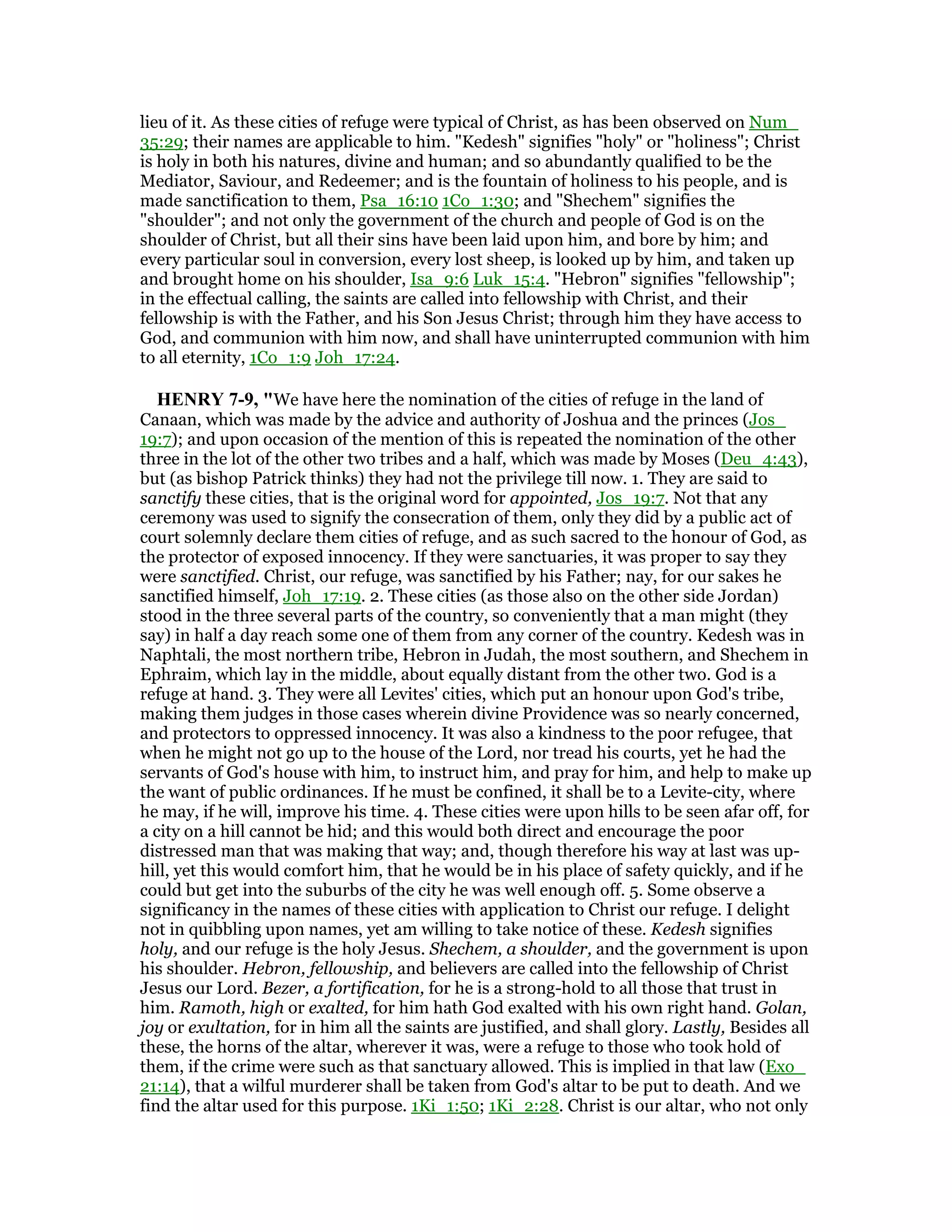

![covered the northern part of the central range including Benjamin, Ephraim and
Manasseh, where Shechem was.
These cities of refuge stressed God’s strong concern for justice. Those who were
innocent should be given a chance to prove it and not be subject to mob law and
family vengeance. They were not strictly a type of Christ for Christ is a refuge for
the penitent guilty whereas these were for the innocent. o man will be expelled
from Christ. But they did stress mercy as well as justice.
Kiriath-arba (Hebron) was a city given to Caleb (see on Joshua 14:14-15), but like
the man he was he was clearly willing for it to become a city of refuge, and indeed a
Levitical city (Joshua 21:11). He believed in giving God the very best. ote again the
prominence of the ancient name indicating early date.
The word for ‘set aside’ is ‘sanctified’ (the same root as Kedesh). The cities were set
apart by God for the purposes of justice and mercy (the name of the city may have
influenced the verb used).
TRAPP, "Joshua 20:7 And they appointed Kedesh in Galilee in mount aphtali,
and Shechem in mount Ephraim, and Kirjatharba, which [is] Hebron, in the
mountain of Judah.
Ver. 7. And they appointed Kedesh.] Heb., They sanctified Kedesh; where there is
an elegancy in the Hebrew that cannot be Anglised. These cities of refuge belonged
all to the Levites, who were best able to judge and to interpose betwixt party and
party, both in respect of authority and advice. The priests’ lips were both to
preserve knowledge, and to present it to the people.
And Shechem in mount Ephraim.] All of them in mountains or on plains, that they
might the sooner be seen and more easily repaired unto: so precious in the sight of
the Lord is the death, not of his saints only, though chiefly, but of his reasonable
creatures. He is the preserver of men, and delighteth to show his philanthropy, or
love to all.
COFFMA , "Verse 7
"And they set apart Kedesh in Galilee in the hill-country of aphtali, and Shechem
in the hill-country of Ephraim, and Kiriath-arba (the same is Hebron) in the hill-
country of Judah. And beyond the Jordan at Jericho eastward, they assigned Bezer
in the wilderness in the plain out of the tribe of Reuben, and Ramoth in Gilead out
of the tribe of Gad, and Golan in Bashan out of the tribe of Manasseh. These were
the appointed cities for all the children of Israel, and for the stranger that sojourned
among them, that whosoever killeth any person unwittingly might flee thither, and
not die by the hand of the avenger of blood, until he stood before the congregation."
What Bible student ever failed to memorize the names of these cities of refuge? That
they occupied an important place in the religious and judicial system of the Hebrews](https://image.slidesharecdn.com/joshua20commentary-160726122214/75/Joshua-20-commentary-62-2048.jpg)
![cannot be successfully denied. These cities were among the most important in Israel.
They were centrally located. There were definite rules enforced for keeping the
roads open and in repair for access to these cities, and proper directions were placed
in all needed places and intersections to insure the ability of the manslayer to arrive
safely at the nearest city of refuge.
Many of the older commentators, such as Adam Clarke and Matthew Henry also
pointed out that the very names of these cities significantly pointed to the salvation
of sinners:
KEDESH. This name means sanctified, or holy,[4] that being the original meaning
of the word, which later also came to mean "a sanctuary,"[5] or "sacred place."[6]
It was precisely this word that came to mean the sacred female prostitutes of
paganism, the [~qedeshah] and their male counterparts, the [~qedesh]; only, in their
cases, the word is spelled with a "q." Of course, that constituted the illegal and
shameful usurpation of a HOLY word for U HOLY and IMMORAL purposes.
evertheless, in its true meaning it appropriately typifies the "sanctified in Christ,"
the "holy brethren" of the .T.
HEBRO . Several meanings of this word are: community or alliance,[7] league or
confederacy,[8] or fellowship.[9] It is not difficult to see the application of this term
to the community of believers in Christ. Because of its elevation at a height of 3,040
feet above sea level, the highest location of a city in Palestine, it also was an exalted
place, even as God's church is exalted above all other human endeavors.
SHECHEM. The word means "shoulder,"[10] with the typical meaning of burden-
bearer, or the carrier of great responsibility as in Isaiah, "The government shall be
upon his shoulder" (Isaiah 9:6). The burden and responsibility for all forgiven sins
rests upon the shoulder of our Lord. "He carried my sins with him there."[11]
BEZER. This word means "fortress,"[12] a word repeatedly and consistently
applied to the stronghold of Christianity in all ages. "A Mighty Fortress is Our
God," the great Lutheran hymn being a well-known example.
RAMOTH GILEAD. "Ramoth means `heights'."[13] Actually, this meaning
pertained to all of the cities of refuge. They were situated on significant elevations to
assure their visibility to all who sought them. Appropriately enough, the church
herself was called by the Lord Jesus Christ, "A city set upon a hill that cannot be
hidden" (Matthew 5:14). The double name Ramoth Gilead brings into focus the
area noted for its production of a healing balm, known and used everywhere in
antiquity. The spiritual counterpart of this is apparent in the great spiritual song,
"There is a balm in Gilead, that heals the sin-sick soul."
GOLA . There are two names applied to this place: (1) "It means `to remove' or `to
pass away', hence, a `transmigration' or `passage'."[14] It is not hard to see that the
collective meaning of all these terms is "sanctified" or "set apart." Dozens of
references in the .T. to the sanctification of God's people confirm the typical](https://image.slidesharecdn.com/joshua20commentary-160726122214/75/Joshua-20-commentary-63-2048.jpg)
![appropriateness of the name of this city of refuge. (2) The other meaning, also
mentioned by Clarke, was stated by Matthew Henry to be "joy or exultation,"[15]
an exceedingly appropriate type of the joy of the Redeemed, who are described thus
by Isaiah:
"The ransomed of Jehovah shall return and come with singing unto Zion; and
everlasting joy shall be upon their heads: they shall obtain gladness and joy, and
sorrow and sighing shall flee away (Isaiah 35:10)."
We conclude this study of the cities of refuge with the following lines selected from a
homily by E. De Pressense:
"The establishment of the cities of refuge is an admiral emblem of the Church. The
Church is a City set upon a hill whose gates stand open day and night to those
whom the law condemns. Only those to whom the Church is open are not exclusively
those who have transgressed unwittingly, as was the case then. All who have broken
the law of God, even with open eyes, may find shelter there, on the one condition
that they enter by the door, of which Jesus said, `I am the door, and no man cometh
unto the Father but by me' (John 10:7)"[16]
or should it be overlooked that the great necessity for the sinful soul-seeking
redemption is that he most certainly should enter. Enter what? Enter Christ, enter
the Church which is his spiritual body. Enter by the door which is Christ, that is, as
Christ has appointed. And how do persons enter him? Turn and read from the Holy
Text itself: Romans 6:3-5; 1 Corinthians 12:13; and Galatians 3:27. The Holy
Scriptures announce no other means of anyone's entering Christ.
PULPIT, "And they appointed. The original, which, strange to say, the LXX. and
Vulgate, as well as our version, have neglected to render, is sanctified (heiligten,
Luther). The selection is itself a proof that our author knew well what he was
writing about. It is not likely that in the later times of Jewish history, when the law
had been forgotten (2 Kings 22:8) and its precepts had long been in abeyance, that
the institution of the city of refuge remained in full force. But we find three cities
selected on each side of Jordan. Those on the west were in the tribe of aphtali on
the north, of Ephraim in the centre, and of Judah in the south. The same is the case
with those on the other side Jordan. Thus every little detail of the narrative, when
closely scrutinised, does but show more entirely how free this narrative is from the
reproach so hastily cast upon it of being a loose and inaccurate compilation,
attempted by a man who had not the slightest literary fitness for the task he had
undertaken. A corroboration of this view may be found in the fact that all these
cities were Levitical cities. Thus, as the crime of homicide was looked upon under
the Mosaic law as a crime apart from all other crimes, inasmuch as it was an offence
against the life which was God's gift, and man, who was God's image, so the
offender who pleaded extenuating circumstances for his offence was placed, until his
trial could be held, under the special protection of the Divine law. For "the priest's
lips should keep knowledge, and men should seek the law at his mouth." It was the
special privilege of the tribe of Levi to possess the "key of knowledge." It was to
them that the duty of ascertaining the wilt of God by Urim and Thummim was
assigned ( umbers 27:21). Thus a special acquaintance with the law (Deuteronomy](https://image.slidesharecdn.com/joshua20commentary-160726122214/75/Joshua-20-commentary-64-2048.jpg)


![BE SO ,"Verse 8-9
Joshua 20:8-9. On the other side Jordan they assigned — Or had assigned, or given;
for these cities were assigned by Moses before he died, Deuteronomy 4:41. They
were not, however, properly speaking, invested with the privilege till now, when
they were applied to the use for which Moses had designed them. The stranger —
ot only proselytes, but others also; because this was a matter of common right, that
a distinction should be made between casual man-slayers and wilful murderers.
WHEDO ,"8. By Jericho — Literally, Beyond Jordan, Jericho eastward. The sense
is, the side of Jordan opposite from Jericho. These eastern cities were appointed by
Moses. See at Deuteronomy 4:41-43. On Ramoth, see Joshua 13:26, note. The sites of
the other two cities are now unknown.
PETT, "Verse 8
‘And beyond the Jordan of Jericho eastward, they assigned Bezer in the wilderness,
in the tableland out of the tribe of Reuben, and Ramoth in Gilead out of the tribe of
Gad, and Golan in Bashan out of the tribe of Manasseh.’
Provision for a further three cities was necessary because of the Transjordan tribes.
These additional cities were also provided for in the Law (Deuteronomy 19:9) and
resulted from the fact that Transjordan was additional to the land of promise. Thus
the emphasis on ‘three’ is emphatic depicting essential completeness of provision. By
the time of umbers 35:6 the number was fixed at six because the occupation of
Transjordan was then known. These latter three cities were in fact initially set apart
by Moses (Deuteronomy 4:41-43). The verb ‘assigned’ = ‘given’ may signify the
secondary nature of their choice as an afterthought, or may simply be an alternative
to prevent repetition.
“The Jordan of Jericho eastward.” An unusual designation. It describes the land
eastward of the Jordan. It indicates a time when the Jordan could be defined in
relationship to Jericho which would be prominent in the minds of the earliest
settlers and confirms an early date for the passage (but see 1 Chronicles 6:78 which,
however, probably had this passage in mind. ote the mention of Bezer).
Bezer was in the territory of Reuben on the tableland in the south of Transjordan.
Ramoth was central and Golan to the north. Bezer (see Joshua 21:38) is possibly
Umm el-Amad‘ and is mentioned on the Moabite Stone. Ramoth in Gilead later
features regularly in the conflicts with Syria. It is possibly Tell Ramith. Golan in
Bashan (see Joshua 21:27) is of uncertain location although Sahm el-Jolan, twenty
seven kilometres (seventeen miles) east of the Sea of Chinnereth had been suggested.
The district of Gaulanitis was named after it many centuries later.
TRAPP, "Joshua 20:8 And on the other side Jordan by Jericho eastward, they
assigned Bezer in the wilderness upon the plain out of the tribe of Reuben, and
Ramoth in Gilead out of the tribe of Gad, and Golan in Bashan out of the tribe of
Manasseh.
Ver. 8. They assigned Bezer.] That is, They confirmed and ratified them according](https://image.slidesharecdn.com/joshua20commentary-160726122214/75/Joshua-20-commentary-67-2048.jpg)


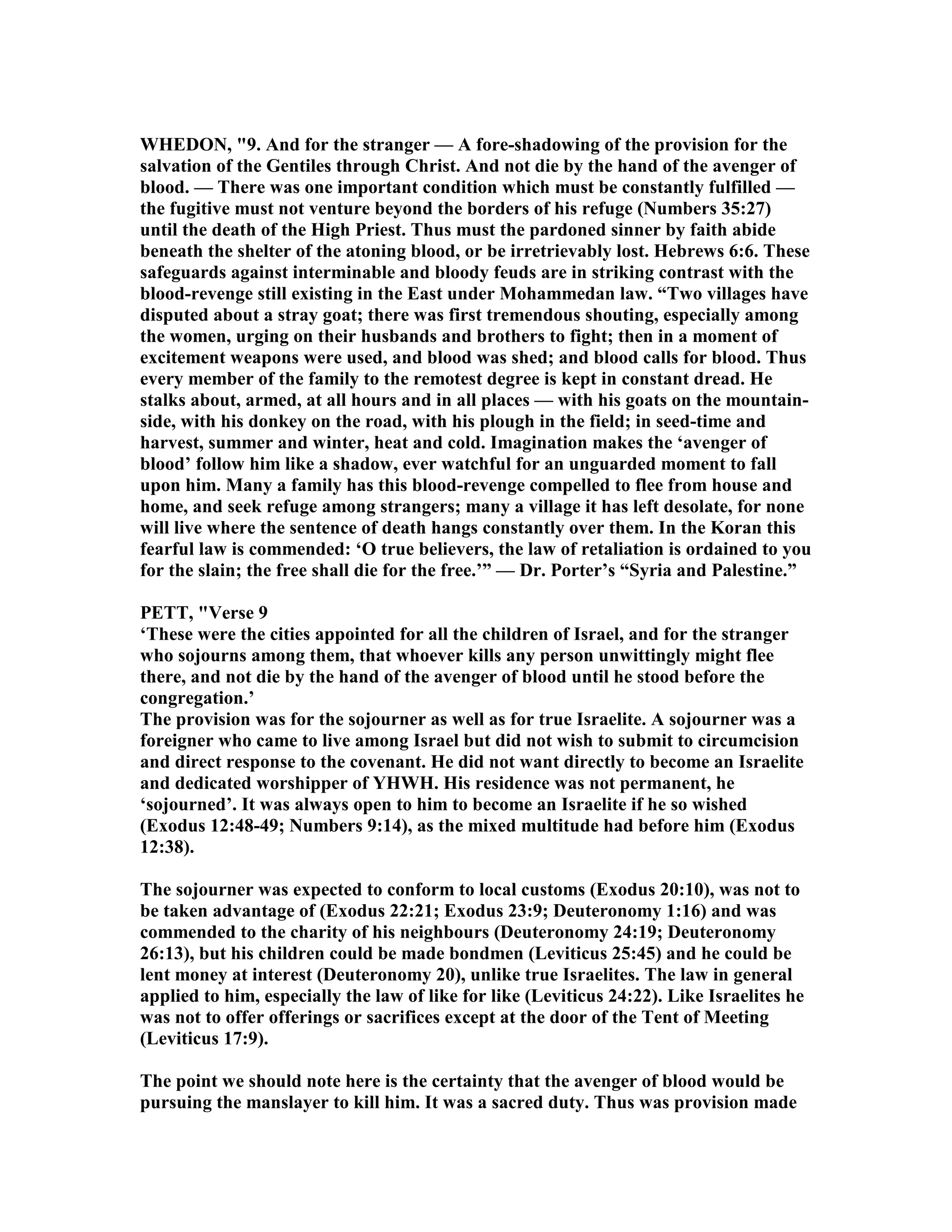
![to ensure that the innocent received a fair trial. He was, however, necessarily
punished by being confined to the city of refuge until the death of the High Priest.
‘Before the congregation.’ That is he was in some way judged by the whole of Israel,
probably through their representatives, either the city authorities, the tribal
authorities or the priests at the sanctuary before YHWH.
Chapter 21 The Establishment of the Levites Throughout Israel.
This chapter contains the approach of the Levites to the leaders, to have cities and
suburbs given to them in accordance with the command of God by Moses. Grants
were made by lot out of the different tribes, details of which are given. The chapter
is concludes by observing, that God gave Israel all the land of Canaan, and gave
them rest in it, according to his promise, and that nothing failed of all that God had
promised.
We do not know the time scale for all these events. The first conquests had taken
around five to seven years (based on the age of Caleb which was in round numbers -
Joshua 14:10). The further surveying of the land and its division according to the
size of the tribes must then have taken quite some time, and we must leave time for
advancement and settlement, the cutting down of forests, the establishing of the
people in various parts of the land, the reconquest of cities, and the discovery that
while the conquest had been a success, in that it had enabled this settlement, there
remained yet much to be done.
At what stage Joshua 20 and Joshua 21 occurred we are not told. But it is clear that
the central sanctuary was now set up at Shiloh and was regularly visited by the
tribes. We need not doubt that under Joshua the regular feasts were held and the
covenant constantly renewed, with the regular sacrifices being offered. Israel were
becoming established in the land.
TRAPP, "Joshua 20:9 These were the cities appointed for all the children of Israel,
and for the stranger that sojourneth among them, that whosoever killeth [any]
person at unawares might flee thither, and not die by the hand of the avenger of
blood, until he stood before the congregation.
Ver. 9. And for the stranger that sojourneth.] Who dwelt with them for a time, and
were not of the same religion: or such only as were proselyted.
Until he stood before the congregation.] Till, after the death of the high priest, and
the avenger’s wrath qualified, he be restored and re-established in his own house,
under the security of public protection. (a)
PULPIT, "Appointed. Or, of refuge or resort. Our version has followed the LXX.
and Vulgate here. Greek, unawares; Hebrew, in error or inadvertently, as above.
Matthew Henry's note on the cities of refuge is worthy of remark. He says, "I
delight not in quibbling on names, yet am willing to take notice of these." Thus](https://image.slidesharecdn.com/joshua20commentary-160726122214/75/Joshua-20-commentary-71-2048.jpg)
